Here's why you need to stop worrying about vacation weight gain
- Lots of people worry about gaining weight while on vacation .
- But it's good to remember that weight is not the only indicator of good health.
- Registered dietitian Emily Fonnesbeck told INSIDER that weight naturally fluctuates all the time, and that a short period of indulgent eating won't make a drastic difference in your weight.
- She also said enjoying your vacation, relaxing about your food choices, and connecting with your traveling companions is just as good for health.
Reality weight loss shows , diet advertisements, and Instagram before-and-afters continually bombard us with different versions of the same misguided message: Weight loss by any means (even unhealthy ones) is cause for celebration, and weight gain is something to be feared at all costs.
So it's not too surprising that many people are nervous about gaining weight when they go on vacation and find themselves surrounded by calorie-dense treats they wouldn't encounter at home. The internet is awash with tips on how to avoid vacation weight gain — and how to lose any weight gained once you get home.
But registered dietitian Emily Fonnesbeck told INSIDER that vacation weight gain — if it happens at all — isn't really worth all the worry it's allotted. Here are four reasons why.

1. Weight is not the only measure of good health.
Weight can be a helpful measure when determining someone's health, but it's not the only one that matters. Blood pressure, cholesterol, and hours of sleep per night, for example, are some of the many other numbers that help gauge your internal health .
Second, it's good to remember that weight loss is not inherently good and that weight gain is not inherently bad. Sometimes people lose weight because they're sick , and gain it because they're getting well .
Even if you do gain weight on vacation, it won't necessarily make you less healthy. Your weight doesn't tell the whole story of your health.
2. It's normal for weight to fluctuate.
"Weight fluctuates naturally from day to day from week to week from year to year and to try to control that — it really just causes distress more than being helpful," Fonnesbeck said.
Related stories
Your weight can fluctuate more than five pounds in a single day because of natural functions like sweating, breathing, peeing, eating, and drinking.
Refinery29 also reported that eating more carbs than usual, eating saltier foods, and traveling to warmer climates — all things that may happen on vacation — can make the body automatically retain extra water . This makes the number on the scale go up, even though your body mass doesn't actually change.
"It's like if you weighed a car on empty, and then filled up the fuel tank — the weight goes up, but the body of the car hasn't changed," registered dietitian Melanie Rogers told Refinery29.
There's some amount of weight change that you just can't control. It can be freeing to remember that.
3. A short period of indulgent eating won't make a huge difference.
"We actually have much more flexibility and much more wiggle room than we've been taught to believe," Fonnesbeck said. "One meal, one snack, one day, one month, isn't going to make that big of a difference."
Even if you do eat extravagantly on vacation, you might find that you want to eat lighter meals once you get home, without even thinking about it. Fonnesbeck said she's seen it happen with her clients — and if you've ever craved a salad after a few days of fried food and pizza, maybe you've experienced it, too.
"I think the real a-ha moment for [clients] is when they experience this for themselves," she said. "They have a week or more of indulgent meals, [then] they come home from vacation and they find themselves naturally gravitating toward foods that may balance some of those choices out. Without having to put too much thought and effort into it, they find that they naturally self-moderate."
But the key to this type of self-moderation, Fonnesbeck added, is actually listening to your body's internal cues to decide what and how much to eat — as opposed to obeying diet rules that you've picked up from the outside world. (By the way: This the core habit in a practice known as intuitive eating .)
4. It's also healthy to truly enjoy your vacation.
Sure, it could be considered "healthier" to forgo an ice cream sundae during vacation. But worrying about your food choices may distract from the reason you're there in the first place: To relieve stress and (if you're with other people) enjoy the company of others. Both of those things promote your health, too. In fact, decades of research suggest that social connections are linked to longer lives and better health , according to the Harvard School of Public Health.
Fonnesbeck acknowledged that it can be difficult to let go of vacation weight gain fears. One way to start is to subtly shift your thinking on the subject.
"Something [you can] practice is to r eally be intentional about noticing other ways that you enjoyed yourself," she said. "Was it a nice break from work? Did you feel like you could have more flexibility with food choices and it made the experience more enjoyable? Were you more connected in conversations because you weren't so busy worrying about weight? Did it cause less anxiety about traveling in general? Looking at overall wellbeing and not just the weight might help someone have perspective on the experience, versus feeling so stuck in that fear."
Sign up here to get INSIDER's favorite stories straight to your inbox.
Follow INSIDER on Facebook .

Watch: Americans think these foods are healthy — nutritionists disagree
- Main content

Grace Fjeldberg, R.D.N.
Diabetes education, nutrition, oncology (cancer), recent posts.

- Behavioral Health
- Children's Health (Pediatrics)
- Exercise and Fitness
- Heart Health
- Men's Health
- Neurosurgery
- Obstetrics and Gynecology
- Orthopedic Health
- Weight-loss (Bariatric) Surgery
- Women's Health
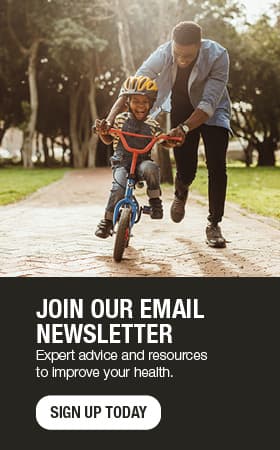
How to avoid weight gain during your vacation

People often express concern about gaining weight while on vacation as if it’s inevitable. The truth is vacation weight gain can be avoided — and fairly easily.
There are many actions you can take to stay healthy while you’re at the cabin, on a road trip or on a cruise. You can enjoy your vacation and stay healthy simultaneously. All you need to do is plan ahead and commit to making smart choices.
Tips for shirking extra pounds while on vacation:
- Pack a cooler of healthy snacks. While traveling to your destination or on a vacation where you’re constantly on the move, bring a small cooler with healthy foods along for the ride. Apples, bananas, carrots, dried fruit, low-fat yogurt and nuts are a few ideas.
- Think twice about fast food. The drive-thru diet plan may seem like a time-saver, but fast food doesn’t necessarily open up time for more vacation activities. If you have to eat fast food, go with healthy options, such as grilled vs. crispy chicken or salads and sides that aren’t deep fried. Use your healthy snack cooler as a side dish supplier.
- Find time for exercise. Cruises and resorts usually offer activities that require some physical exertion. Try those out and get your heart rate going. You may not be able to hit the gym every day, but simply moving around is good for your body. Biking, hiking and swimming are wonderful sources of physical activity, too.
- Honor your hunger, but be smart. All-inclusive vacations afford you with constant access to food. Or maybe your family likes to cook colossal cabin dinners. Whatever your situation, be mindful of portion sizes, and never eat to a point where you’re uncomfortable. Fill half of your plate with fruits and vegetables. The other half should be a mix of grains and lean sources of protein.
- Keep your alcohol consumption under control. Alcohol can increase your appetite. Additionally, many alcoholic drinks are high in calories. Indulging in an adult beverage is fine as long as you do so in moderation.
Related Posts
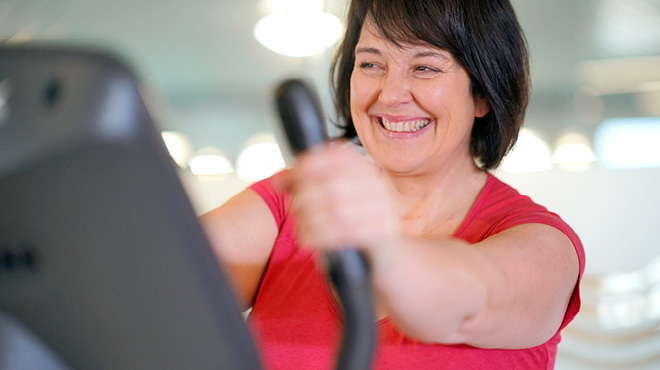
- Skip to main content
- Skip to primary sidebar
- Skip to footer
January 11, 2023
The Math Behind Vacation Weight Gain
You come home from your vacation declaring a 10 pound weight gain. But a week later you feel back to normal. Diving into the math behind vacation weight gain (or holiday weight gain) will help you realize it’s not as dramatic as you think. Enjoy your trip knowing that your regular healthy eating patterns matter much more than a few days of indulging.

I still dream about that amazing 10′ sprinkle cake from the Nest County Fair!
More than a decade ago when I had just finished losing my college weight, I used to weigh myself daily. But the scale started to control my emotions and I knew it was no longer serving me.
I gave up the scale years ago.
These days, the only time I hop on a scale is at the doctor’s office. My goal is to feel good in my body and in my clothes. A scale tells me my force against the earth, but it can’t tell me how I feel.
Using a scale
A scale can be a useful tool to track long-term trends and motivate someone to lose weight if they have received medical advice they need to.
I don’t think that all scales need to be banished from society, as they serve a purpose for those whose health would benefit from weight loss.
But if you’re healthy and happy at your current weight, a scale will likely cause more frustration than cheer.
As I have made peace with my body over time, I realized that the number on the scale discouraged me more than it helped.
Stepping on a scale after a vacation was one of those times. I have overheard folks report back from a week-long vacation, “I gained 10 vacation pounds on my trip to Italy!” I want to tell them to weight it out. Extra water, food in your system, and alcohol consumption can all be contributed to weight gain that isn’t necessarily going to stay with you.
It takes two days for me to lose some water weight
I’ve learned that it takes about two days into a vacation of eating more than I usually do, in both portion size and richer foods and alcohol, to notice that my body feels different.
And upon my return it takes me about 4 to 5 days of regular meals and my exercise routine to feel normal again. Most of this extra weight is in the form of water.
Remember that to gain a pound of fat you have to eat 3,500 calories more than your body needs to burn to function . (Just like you need a calorie deficit of 3,500 to lose a pound of body fat.)
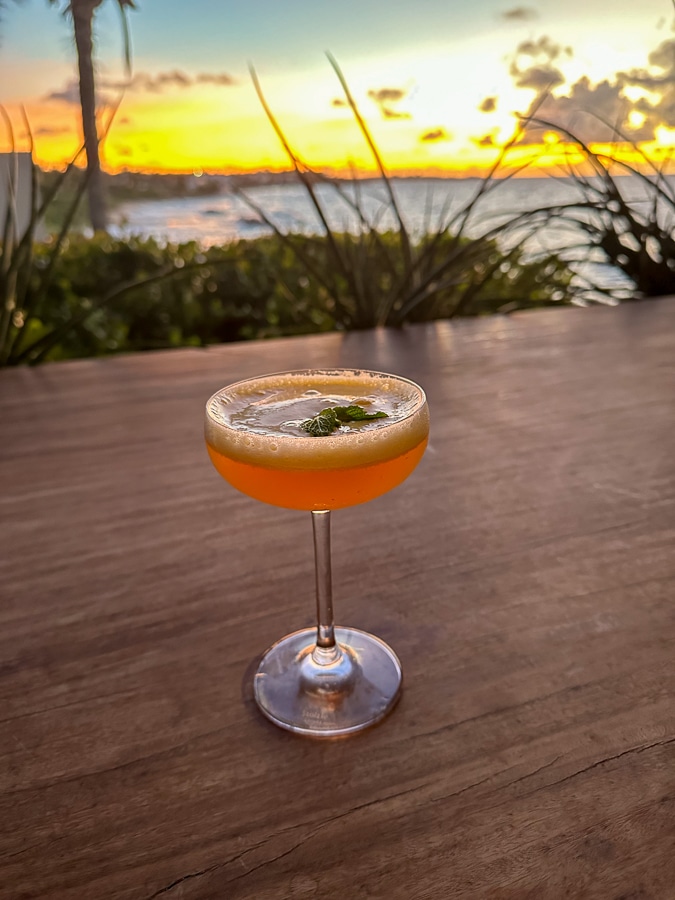
Consider a vacation to a big city where you might walk five miles a day sightseeing, visit a hip new fitness studio once during the week, and go for one run while you’re there.
You are likely burning 2,200+ calories per day.
That means you’d have to eat 2,200 PLUS 500 calories more every day to average a single one-pound weight gain on your trip.
If you came home from your vacation 5 or 10 pounds heavier on the scale, you likely didn’t eat 17,500 calories above your needs in a week – that would be an average of about 4,850 calories per day!
Now I know I’ve probably come close to eating that number in one day before, but not seven days in a row.
I find that my body usually wants to eat less the day after I eat a lot. #balance
You are thinking: How did I gain 10 pounds on a vacation?!
All those pounds are mostly water weight. The reason for the five-pound “gain” is water retention.
Not only do certain rich foods leave you retaining water, but you also have the physical weight of the excess food traveling through your system for at least 48 hours or so. Kind of gross, but it’s in there!
Once you’re home, just slip back into your healthy routine (you’ll probably want to!), stock the fridge with fresh produce, and wait it out.
The squiggly line effect will take care of the rest.
Do not weigh yourself right after a vacation.
Wear your stretchy pants (so as not to get discouraged by tight jeans) and see how you feel a few days later.
I bet the jeans fit perfectly.
I used to feel more self-conscious about my post-vacation bloat, but then I realized that no one else can tell . It’s more about how you feel than how you look.

Tips to FEEL Your Best on Your Vacation
Aim for three meals per day..
If you’re like me, you tend to eat more at each meal while traveling than when at home. But I find that because I’ve had a bigger lunch, I don’t really need a snack! My body is smarter than I think.
Curb the booze.
I know, I know. Drinking beer all day at the lake might be the best part of your summer! But at least for me, nothing makes me feel worse than dehydration or a hangover.
Definitely enjoy some drinks, but just don’t get hammered, ok?! You can probably easily drink a lot more calories than you can eat. Over-drinking is the number-one way to feel terrible.
Bring just one part of your workout routine with you.
That could be just a run along a new city’s river or a power walk on the beach. Or yoga via podcast in your cozy cabin one morning. Or a trail hike in a new part of the world.
Breaking a sweat will help you feel your best. And walking totally counts!
I find after the first day or so I actually want to go for a run or visit the resort fitness room for a little sweat session.
Focus on foods that you can’t get at home.
When we were in Anguilla I was all over the tropical fruit! Green juices, fresh pineapple, mango, kiwi, papaya. I had their delicious chia pudding and some eggs for protein. I chose to skip the waffles, pastries, and french toast that I can easily get at any American buffet.
For lunch I chose Caribbean fish tacos and opted out of the burgers and french fries I can get at any restaurant anywhere.
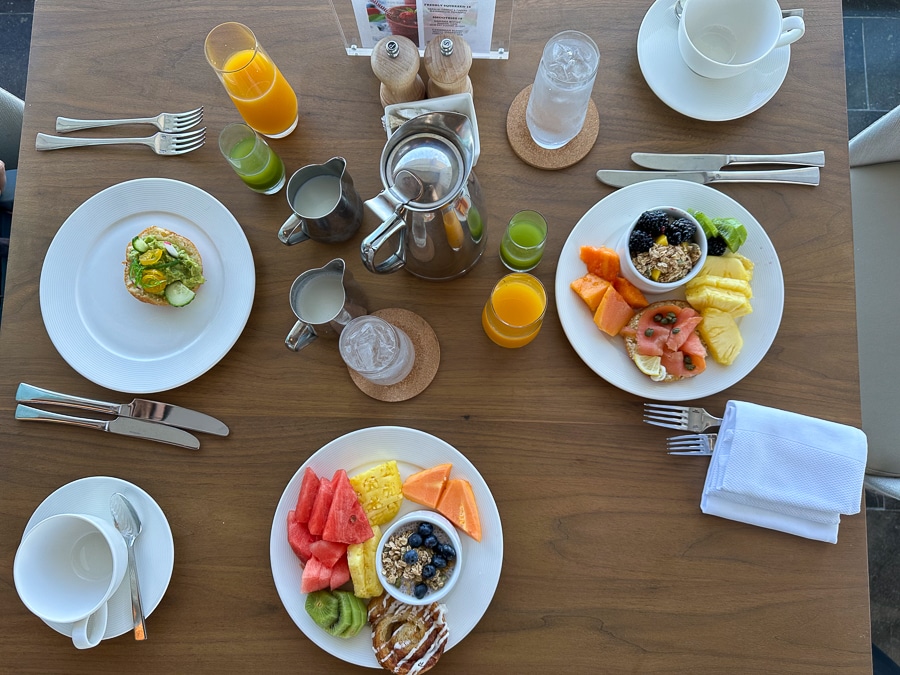
Add in a little mindfulness.
I am ALL FOR enjoying your trip and indulging in the most delicious foods you come across. But just make sure they are good ones.
Don’t gobble down a gas station donut on your car trip. Visit that local ice cream shop that is known for their birthday cake ice cream and use your five senses to devour it.
How To Have A Healthy and Happy Vacation: Don’t Worry So Much About Weight Gain!
As a Registered Dietitian, I’m telling you to relax during your vacation. Knowing the math and how my body operates helps me truly embrace the trip.
Remember that just a few days of healthy eating is all it takes to counteract a few days of overeating.
Your long-term eating habits in your regular daily life are way more important than those you adopt for a few days away.
- My Wellness Program
If you’re interested in learning more about an intuitive eating approach to wellness, check out my wellness program, Bloom . You’ll get 6 weeks of lessons on mindful eating, preparing balanced meals, nutrition foundations, and finding exercise you love. All for just $67!

My Health + Fitness Faves
More posts on weight change:.
- Weight Change: Density + Volume
- Postpartum nutrition + weight loss
- How to gain and lose 5 pounds
- How to keep the weight off
- The Crossroads of Happy + Healthy
- 7 Diet Tweaks for Weight Loss
- Then & Now
Reader Interactions
January 29, 2020 at 8:20 am
“A scale tells me my force against the earth, but it can’t tell me how I feel” – Thats one of the best lines I’ve ever read!! So true – Thank you!
Kath Younger says
January 29, 2020 at 9:04 am
Jill D says
January 29, 2020 at 9:42 am
I needed this today. it is my weigh-in day and I have been dreading it because I had an indulgent weekend. I lost 60 pounds 2 years ago but I re-gained 10 pounds over the course of a year. I was okay with that because my clothes fit and I exercise consistently. Unfortunately, after getting on the scale in early January that 10 pounds had turned into 20 and my clothes are not fitting. Time to do something before the 20 turns into the 60 plus.
However I need to keep it in perspective and know that whatever the scale says tonight that a weekend is not going to destroy all of the effort of the previous 3 weeks or 2 years.
Thanks for the reminder.
January 30, 2020 at 8:30 am
Great job losing the 60 pounds! That’s so hard! I’m on a mission to lose 40 (It was 60 but I lost 20 almost two years ago, but then put 10 back on..then lost 10 … so now just the 40 to go). It’s so hard! Kudos to you! It’s always comforting to hear from others in the same boat. (And for the reminder that a few bad eating days won’t mess up the progress we’ve made).
January 30, 2020 at 4:28 pm
Good job to you as well. The mission to be healthy is much easier with the support of people who understand the struggle and the pitfalls. Be kind to yourself!
The Many Thoughts of a Reader says
January 29, 2020 at 11:04 am
In the same thought process, do not weigh yourself on a Monday morning! Give yourself a day of back to the regular week day grind before you torture yourself if you are weighing weekly!
Brigid says
January 29, 2020 at 1:03 pm
I’m dreaming about that cake now!!!
January 29, 2020 at 1:42 pm
Ugh me too!!!! This was from a big real estate party that we went to two years ago. I went this year with very high hopes there would be a 2.0 cake but alas there was not one. I asked a friend in the know and she said that there were so many SPRINKLES to clean up the year before that the venue said they couldn’t do it again!! Isn’t that sad!!?
February 4, 2020 at 12:10 pm
That cake is what dreams are made of.
Stacey M. says
January 29, 2020 at 1:11 pm
Thank you so much for this post. I think this is something so many women need to better understand … and maybe it’s not something that can be taught but rather something that comes with age. I know it took me a long time to *really* pay attention to my body (instead of what some fitness professional, or magazine, or weight-loss guru on TV was telling me) and realize that our bodies are smart and they will tell us what they need. If you want to kick back and enjoy your vacation, go ahead and do so. Eat and drink what you like, but pay attention to how your body feels after you eat/drink various things. It’s almost a given that if you do this, you’ll notice the things that don’t make you feel so great vs. the things that energize you and give you the energy to go about your activities. There’s no need to fear any food, or a week’s full of indulgences if you follow these rules. Like you said, after a day or two of heavier, more indulgent foods, you’ll likely find that you crave something lighter (like a salad or fruit) instead of steak and potatoes. I am so glad so many more RDs are coming around to this way of thinking … spreading this kind of thought will serve so many more women in the long run than messages like “lose those last pesky 10 pounds” or “tighten that bum with this 7-day meal plan” or “don’t eat more than X amount of calories if you want to lose weight”. Sorry that was so long-winded but this is something I’m pretty passionate about after having fallen victim to diet/weight loss messages when I was younger and losing myself to an eating disorder for a few years. <3
January 29, 2020 at 1:39 pm
Thanks for your thoughtful comment! Couldn’t agree more.
January 29, 2020 at 1:59 pm
My biggest suggestion for vacation weight gain is to walk everywhere (when possible). I’m usually the same weight or less after vacation because we walk so much (and I don’t put much thought or stress into what I eat). We often choose the hotel based on location and walk everywhere within a few miles. We’ve found we see more of the city walking rather than driving or riding and have found so many unexpected restaurants and entertainment walking. An added perk is we avoid the cost of renting a car. For traveling longer distances, most cities have great public transportation and/or shuttles between the hotel and airport.
January 29, 2020 at 2:13 pm
Agree! Great tip.
March 29, 2023 at 1:03 pm
Walk in Uber out! Is my motto!
January 30, 2020 at 12:39 am
Just a small one, you write 3,500 kcal to gain a pound of fat. Guess the 3, is a typo 😉 just to eliminate any confusion.
Leatitia Samson says
January 31, 2020 at 1:20 pm
The 3 is correst. It takes 3500 kcal to gain a pound of fat (three thousand five hundred).
January 30, 2020 at 12:42 am
Unless you mean for 7 days – which I caught now 🙂
January 30, 2020 at 5:21 am
Amanda says
January 30, 2020 at 12:08 pm
I like how you said to gain a pound of fat, you have to eat 3,500 calories more……Usually we hear about how you have to burn off that 3500 to lose a pound of fat. When I think of it the way you said it, I’m like “Oh, that’s a lot extra to have to eat and I’m not even sure I can do that for days in a row”.
Lzabel Goulart says
January 31, 2020 at 5:19 am
I am lucky. I do not gain weight after vocation…I love your amazing 10? sprinkle cake.
Ruthie says
January 31, 2020 at 10:22 am
This is great information. Thanks so much. Have a good weekend!
February 3, 2020 at 8:35 am
You can swap out vacation and sub in “holidays”, “birthday weeks”, “too many happy hours”, etc! LOL! It will all work out in the end.
February 5, 2020 at 7:23 pm
I find this so interesting! When. I work a desk job, so my vacations are super active by comparison! I find that I’ve often lost weight upon returning – I love going to major cities like New York, Paris, Prague – where it’s likely I’ll get 15-20K steps a day – in addition to any bicycle tour or whatever else. Even in Hawaii, where I did a LOT of relaxing, we still kayaked, did SUP, hikes etc. I’m not even a particularly athletic person – but I like moving on vacay!! Stimulates body and brain!
Melissa says
February 23, 2021 at 10:29 am
I gained 10 pounds (119 to 129) in 5 days at an all inclusive, been back 2 days and only lost 3…! I know at least 5 of this is fat, I can see it. It’s amazing how QUICKLY we can gain fat after we had been dieting. I am back to my routine and guess it will take about 2 weeks to lose. This article is a bit deceiving as yes SOME of vacation gain is water and inflammation but unfortunately not all or even most of it. When you are a short girl it’s VERY easy to gain as our TDEE is so low. My hubby on other hand eat way more than me gained 6 pounds and already lost 4lbs in 2 days. The point is to get your head out of sand (literally lol) and get back to calorie deficit to lose that weight before it becomes a permanent feature. Enjoy vacation yes but understand you will have some work to do when you get back.
February 23, 2021 at 10:33 am
I challenge you to weigh yourself again in a few days! I bet it’s still water weight coming off.
MARISOL COLL says
April 14, 2023 at 3:28 pm
I am with you. I just got back from Hawaii gained 5 ..lost 2 and its been a week still feel heavy
April 29, 2022 at 1:13 pm
But it’s now been a week and a half since coming home from vacation and the extra vacation weight gain is still very much present…. I thought it was water weight too but the scale hasn’t budged back to my pre-vacation regular weight 🙁
August 27, 2022 at 10:00 am
The problem for me is not how much I weigh when we get back in town but how I feel 2 days into the trip…My skin feels distended, my clothes are tighter – especially around the waist – and I feel grouchier and more on-edge as a result. And this is not due to what I eat or don’t eat but the simple fact that my body knows I’m in a strange place and “battens down the hatches” as it were, in response. Everything may relax after a few days but this initial bloat is hard to recover from if we’re traveling around by car (i.e., sitting) or eating out a lot. Our trips generally center around national parks with lots of hiking so this helps, but meals can be at odd hours including later at night than I normally eat (which does make a difference for me) so I have to choose between skipping dinner and more weight gain. I was able to take the edge off during a recent trip to the beach, by doing my workout before breakfast and then eating a late breakfast and a late lunch/early dinner so that we just ate 2 meals per day – and we brought a lot of our own food which I prepared myself. But this is atypical of most of our trips. Now we’re planning a trip to Hawaii and while I’m beyond the age of wearing anything skimpy (if I ever did) I’m still dreading the disappearance of my waistline and how I’ll feel for most of the trip. Lots of walking, lots of water, low-density foods, limited sodium…anything else?
March 29, 2023 at 5:28 pm
Another thing I’ve thought of for mid-trip bloat is a natural diuretic like dandelion tea. Has anyone tried this?
January 11, 2023 at 10:56 am
Ooh that cake in the first photo looks delicious (and now I want cake!) I don’t think I’ve ever come home from a vacation with a significant weight gain – am I vacationing wrong? (Lol) Well, with Covid and work, I’ve only been able to afford long weekends away over the past two years versus an entire week. My last vacation was a college reunion weekend this summer, and I came home happy and dehydrated 🙂
January 11, 2023 at 12:54 pm
Sounds like you’re doing it right!
January 11, 2023 at 8:15 pm
I agree; my experience has been similar as well!
TeriLyn Adams says
January 14, 2023 at 12:40 pm
Such a good post! I just got back from a trip and my jeans are definitely tighter – the math was a great reminder that I did not likely gain 10 lbs!
January 14, 2023 at 2:31 pm
Leave a Reply Cancel reply
Your email address will not be published. Required fields are marked *
Notify me of new posts by email.
This site uses Akismet to reduce spam. Learn how your comment data is processed .
Get my exclusive promos –>
Hi im kath..
I'm a Registered Dietitian, healthy eater, and mom of two from Charlottesville, Virginia. Here you’ll find a healthy mix of real-life meals made from whole ingredients balanced with the pleasures of life, including buttercream frosting and good wine. Plus a sprinkle of nutrition, home life, beauty, parenting, and travel. about | privacy policy | contact
- Oatmeal Recipes
- Salad Recipes
- Smoothie Recipes
- All Recipes
- Healthy Mindset
- Charlottesville
- Digital Clutter Course

7 Dietitian-approved strategies to avoid vacation weight gain
- 3 Minutes Read

Vacation weight gain gets the "worst souvenir" award, and you don't want to bring it home from your trip. Learn how to avoid it while still enjoying every moment of your travels.

How can I prevent vacation weight gain?
Vacation weight gain is not inevitable. Follow simple strategies to keep the calories in check and add physical activity while having fun. You may be pleasantly surprised that you don't gain weight during your vacation.
7 strategies to keep vacation calories in check
1. set a goal to maintain, not gain.
Put your weight-loss goal on pause during vacation. When the goal is to maintain your weight (rather than lose) during a trip, it removes pressure and tension about eating in new food environments or cultures. Plus, keeping your current weight during vacation instead of gaining sets you up to resume your progress when you return-no drastic measures needed.
You may take a break from tracking during vacation or track only exercise, not food. You could simply practice portion control and other skills you've acquired to hold the calories in check. Logging exercise could keep you more mindful of food intake and portion sizes by keeping the "night light on" in terms of calorie awareness.
2. Don't drink your calories
Smart beverage choices make a huge calorie difference. Passing over a caloric drink leaves room for more of the local dining you really want to savor. Instead, choose low-calorie beverages or simply use a smaller glass.
Examples of calorie savings:
- Water (0 calories) vs. 32-ounce lemonade (400 calories)
- Flavored herbal tea (10 calories) vs. 32-ounce soda (400 calories)
- 4-ounce orange juice (55 calories) vs. 12-ounce orange juice (165 calories)
- 8-ounce 2% milk (125 calories) vs. 16-ounce 2% milk (250 calories)
- 1.5-ounce bourbon on the rocks (97 calories) vs. 12-ounce can of regular beer (140 calories)
- 6-ounce glass of wine (150 calories) vs. 12-ounce frozen margarita (300 calories)
Pack a reusable water bottle to stay hydrated when traveling. It saves you money and keeps you going strong, so you can make the most of your vacation.
3. Plan ahead
Eat something nutritious before heading to the airport. Bring healthy snacks for the plane and car. Those "snack" bags of trail mix in the airport or convenience stores often contain three servings per bag. The 150 calories on the nutrition label don't sound so bad until you realize the bag contains multiple servings.
Pack a healthy snack or meal to eat for the plane. Although you can't go through airport security with liquids and gels (e.g., yogurt), solids are allowed. Consider prepping these healthy eating noshes for traveling: sandwiches, salad, raw veggies, cheese, fruit, nuts, seeds, or protein bars.
Check whether your hotel room includes a small refrigerator and microwave and what options (if any) exist for breakfast. Research local grocery stores and markets to grab some healthy food when you arrive.
4. Practice portion control
Excessive restaurant portions, all-you-can-eat buffets, and enticing local cuisine make it tricky to limit vacation calories. If you have access to a refrigerator, plan for leftovers. When possible, serve yourself using a smaller plate, glass, or bowl.
Portion control means you don't have to deny yourself local treats. Studies have shown that we get the most enjoyment from the first few bites of anything we eat. After that, our enjoyment goes downhill fast. So, by taking only a few bites instead of finishing that yummy cheesecake or cookie, you get to enjoy the treat, and also save on calories. Splitting a treat is a fun way to sample something new while limiting calories.
5. Seek out veggies
Fill half your plate with veggies. If the menu is strictly a la carte, add veggies to your order or at another meal that day.
Choose a restaurant that offers more veggies than just pickles, lettuce, and tomato on a fried sandwich. Seek out local farmers' markets for fresh and seasonal local produce.
Fill your dinner plate with fresh salad and use the smaller salad bowl or plate for the entree. This easy dish switch can save hundreds of calories, leaving room for a small treat later.
6. Focus on non-food activities
Vacation is more than just about the food-it's about relaxing, exploring, and spending time with loved ones. Throw Frisbee with the kids, catch lightning bugs, challenge everyone to a hula hoop contest, or go on a walking tour when sightseeing. You may have so much fun it doesn't feel like exercise.
7. Plan an active vacation
Many activities are available to enjoy, whether you enjoy hiking, walking, bicycling, kayaking, or swimming. Find guided active vacation options. You can search the name of the area you are visiting and the type of exercise you enjoy. For example, search "London walking tour" or "Michigan bicycle vacation." Rather than a bus tour, look for a walking tour of the city-research local options before you go. Find the best hiking or bike trails, walking tours, or hotels with the best pools or fitness centers.
Check your steps each day to validate all the walking you are doing on vacation. It can keep you in a healthy mode. And don't forget to pack your active wear, including supportive shoes!
Enjoy your special getaway, and if you follow these simple strategies, you may discover the scale dips in your favor with no vacation weight gain.
Related Topics
Dietitian top-picks for healthy snacks that travel well Planning outdoor activities with family and friends that burn calories 10 Dietitian-approved healthy camping meals to get you through summer
Still new to MyNetDiary? Learn more today by downloading the app for FREE .
- Share this post:
Read this next

Losing Weight on Vacation

Vacation - Aim to Maintain Not Gain

Did you know that stress can directly impact your diet? Here’s how to stay on track when you feel overwhelmed

What’s for dinner tonight? Check out this recipe database within MyNetDiary for healthier, more compelling cooking at home

Asian inspired mayo-free coleslaw: The perfect side dish for your next BBQ!

Time to bust the myths and add strength training for a safer and healthier lifestyle
Start your free food diary today.

- Share full article
Advertisement
Supported by
Travel Tips
How Not to Gain Weight on Vacation

By Shivani Vora
- Aug. 5, 2016
Are extra pounds an inevitable consequence of a fun-filled vacation? They don’t have to be, according to Harley Pasternak, an exercise physiologist, nutritionist and personal trainer in Los Angeles. “Gaining weight on vacation is common, but it’s possible to go away, enjoy yourself and not come home heavier,” he said. Here, he shares his tips on how to do just that.
Travel With an Activity Monitor
You don’t have to bother with a gym on your getaway but it is important to stay active, and a wearable fitness tracker like a Fitbit or a pedometer is an easy way to quantify your efforts, Mr. Pasternak said. “In fact, you should be moving much more when you’re on vacation than at home because you aren’t bound to your desk,” he said. On urban getaways, walking to see the sights instead of using public transportation and taxis counts as activity. On beachcentric trips surfing, snorkeling and hiking are great ways to stay fit and get a sense of your destination. To keep pounds at bay, Mr. Pasternak suggested hitting at least 12,000 steps a day, about six miles.
Indulge Wisely
A vacation isn’t a pass to eat high-calorie foods all day, every day and may even be an opportunity to make healthier choices. “People tend to mindlessly eat when they’re working because they are so time-pressed, but on vacation, when you’re rejuvenating yourself, you have the chance to choose your meals with more thought and really savor them,” Mr. Pasternak said. That said, sampling local specialties is a pleasurable part of any trip, so feel free to indulge in them but in moderation. Choose foods the area is known for, such as gelato in Italy, croissants in France and steaks in Argentina.
Go Easy on the Alcohol
Too much alcohol is an all too familiar vacation pitfall, and if you have even two drinks a day, a weeklong trip adds up to 14 drinks and thousands of extra calories, especially if you’re sipping sugary cocktails such as margaritas. If you want to imbibe, Mr. Pasternak said, count the drink as your one daily indulgence, and choose lower calorie drinks such as a vodka soda with a wedge of lemon.
Unplug From Technology
Yes, minimizing the time you spend on your cellphone, tablet and computer when you are vacationing will really help prevent weight gain, Mr. Pasternak said. “The artificial light from these devices plays havoc on our brain and triggers stress, which increases the hormone cortisol, which, in turn, causes us to gain weight,” he said. Instead of turning to technology, he suggested reading lighthearted books and magazines; they’ll help you decompress and lower your stress levels.
A Guide to Better Nutrition
Avocados are great on toast, salads and burgers, or just sprinkled with salt. Plus, they’re healthy — but how healthy ?
Ultraprocessed foods are clearly linked to poor health. But scientists are only beginning to understand why .
Calorie restriction and intermittent fasting both increase longevity in animals, aging experts say. Here’s what that means for you .
A viral TikTok trend touts “Oatzempic,” a half cup of rolled oats with a cup of water and the juice of half a lime, as a weight-loss hack. We asked the experts if there was anything to it .
Sodium is everywhere in our diets. But how much salt is too much ?
Patients were told for years that cutting calories would ease the symptoms of polycystic ovary syndrome. But research suggests dieting may not help at all .
- Diet & Nutrition
- Dietary Supplements
- Herbs & Spices
- Sleep Centre
- Elderly care
- Sex & Intimacy
- Marriage & partnership
- Mental Health
- Mind Over Matter
- Consciousness
- Mantras & Chants
- Browse all topics
- Book Reviews

How to avoid weight gain during frequent travel
Whether it's for work or pleasure, erratic travel may affect your health negatively and also lead to weight gain. Here are tips for how to stay healthy and beat jet lag too
Are you a frequent flyer who collects airline points and piles on weight during your travel? In this current day and age, we travel for work, we travel for pleasure, we travel to meet family, we travel to take time off…the list goes on. Whether or not you are a travel enthusiast, the impact of travel on your body is the same. It is often also an excuse for most people to avoid making a lifestyle change. Indeed, travel is cited as a major obstacle by many who want to lose weight.
The key reasons why we tend to put on weight while travelling are: disruption of the Circadian rhythm, imbalance of our gut bacteria and of course, unplanned meals and junk food.
Circadian clock
Circadian clock or circadian rhythm is more often called our “body clock.” This internal clock, which is present in almost all living organisms, is responsible for regulating sleep and wake cycles, hunger and satiety, hormone balance, and behaviour. It is driven by a master clock located in our brain which is connected to other “peripheral” clocks located in different organs like the liver, the gut and so on. This master clock runs on a 24-hour schedule by receiving cues from our environment, such as light, darkness and food.
Gut bacteria
Gut bacteria are the trillions of bacteria that reside in our intestine/gut. They have their own clock which sends signals to the master clock in the brain. These bacteria play a critical role in our metabolism, mood, health of our brain and heart and how our body absorbs nutrients from food.
When the gut bacteria and our circadian clock are not in sync, our health starts spiralling downward. Travel, even if it’s domestic travel and does not involve different time zones, could send our body rhythm out of balance.
Three things that affect gut bacteria
- What we eat
- When we eat
- Our sleep-wake cycle
Apart from this, the geographical location also makes a difference, though studies in this area are at early stages.
The reason why we feel tired and sluggish at the end of a road or rail trip [even if we just read or slept during the travel] is because we spend our time doing something that is out of our normal pattern. This also disrupts the body clock and gut bacteria.
The travel fatigue that we feel after a long day of travel within the same timezone should go away with one night of sound sleep, hydration, nourishing food and a warm shower. The recovery is not so smooth and quick if you are travelling international or across more than two time zones and that’s what we call a jetlag. Jetlag doesn’t go away with one night’s sleep and hydration because the circadian clock is not synchronised with the location and external environment.
It takes time to realign our biological clock . Our body needs approximately 2/3 rd the number of days as the time zones we have crossed to adjust itself.
Tips to avoid weight gain during travel
Whether it’s a fun domestic trip or an international trip for work, if we plan the travel carefully, we can avoid putting on weight, feeling bloated or having water retention at the end of the travel. Some of the things that we could do are:
- Carry your own food. This ensures that you are in better control of what you eat [and what you don’t end up eating]. People tend to give in to temptation when they are hungry and don’t have much choice
- Avoid alcohol, packaged juices, refined foods and desserts during the journey. Travel by itself is dehydrating, especially flight travel. Sugar , alcohol and juices [which are a concentrated source of sugar with almost no fibre] will only worsen it
- Avoid refined, fried, salty and ultra processed food
- Carry fruits, nuts, cooked rice, beans, nut balls, sandwiches etc. These will make it through most security systems and are less messy to pack and carry
- Keep sipping water through the journey. This will keep you hydrated
- Move around more, walk as much as you can
- Use ginger to your fatigue rescue. Have ginger tea, or dry sweetened ginger or ginger chews once you reach the destination to help you get rid of bloating and get back your appetite and digestion.
How to adjust your body clock quickly after travel
- Use light and dark to set your biological clock. If it’s morning when you reach your destination, get exposed to sunlight often through the day and that will keep you awake too. If you reach your destination at nighttime, reduce the lighting indoors and any light emitting devices [including phones, tablets and TV]
- Change your meal and sleeptime according to the destination timezone from the moment you start your travel, through the journey
- If it’s nighttime at your destination and you are not sleepy, have a glass of warm milk with a pinch of turmeric powder and nutmeg powder. That will help you fall asleep and improve your immunity that’s disturbed by the travel
- Workout first thing in the morning once you reach your destination. A few rounds of suryanamaskar or a light jog or run in the fresh crisp morning air for 20-25 minutes is enough to awaken your senses and make you feel fresh and ready for the day.
With the current lifestyle it is not possible to avoid travel. Following these tips will help you enjoy the travel and reduce the impact of travel on your waistline, mood and overall health.
- Facebook Messenger
LEAVE A REPLY Cancel reply
Save my name, email, and website in this browser for the next time I comment.
- Write for us
- List of authors
- Privacy policy
- Terms of use
How to avoid weight gain while on vacation
Dietician offers nutritional advice.
Story by: Patrick Donovan on July 2, 2018
Traveling is something many look forward to during the summer months. However, it can be easy to let your eating habits slip and choose convenient, unhealthy options while on the road or in the airport — leading to vacation weight gain.
“It is very easy to gain weight during travel,” said Hope Theiss, licensed and registered dietitian with Norton Weight Management Services. “During trips, you are off your normal routine, and that is why it is critical to stick to healthy foods. Your body will thank you.”
Here are a few tips to consider the next time you hit the road.
Eat breakfast foods that are high in protein to help you feel full until lunch. A good option is eggs or a lean meat such as turkey bacon, which will give you energy and keep you satisfied. If you prefer a healthy carb boost, have a cup of fruit and oatmeal. This is an excellent choice for the first meal of the day.
While it may seem tempting to overindulge on heavy and greasy food for lunch, don’t give into your cravings. Avoid starchy, greasy foods that are high in carbohydrates. These will leave you feeling sluggish, and you’ll need energy to tackle your vacation agenda.
Lettuce wraps are an excellent on-the-go option. Or consider packing healthy foods from home if your options will be limited en route to your destination, or if where you will be staying has a refrigerator. Plus, this will save you money.
One excellent tool to help you stay on track with eating well is using a mobile app called “HealthyOut.” It allows you to set filters like “low calorie,” “high protein” or “vegetarian” and uses your location to find restaurants nearby that meet your criteria.
Still not sure what to eat? A grilled or baked protein item is ideal for dinner. A side of vegetables or a salad with dressing on the side are excellent options.
Healthy snacks
Bring healthy snacks from home. Consider packing nuts or making your own trail mix with nuts, dried fruit, light popcorn or salt-free pretzels. Apples, oranges and other fruit also are easily portable options.
Protein bars are a good snack option as well. Ideally, they should have less than 15 grams of carbohydrates in a serving.
Additional tips
- Drink plenty of water to help with energy and digestion. Theiss recommends dividing your body weight by two and then drinking at least that many ounces of water every day.
- Keep alcohol to a minimum. It has no nutritional benefits, can dehydrate you and affects proper sleep patterns.
- Pack protein powder. It can be dissolved in milk or water and can replace a meal or serve as a large snack.
Use these tips and you’ll be well on your way to a happy and healthy vacation — without bringing home extra pounds as an unwanted souvenir.
Schedule an Appointment
Select an appointment date and time from available spots listed below.

Why Do I Gain Weight When I Travel
Sharing is caring!
As a frequent traveler, I’ve noticed that every time I embark on a new adventure, my waistline seems to expand along with my horizons. It’s frustrating and confusing – why do I gain weight when I travel? After some research and personal experience, I’ve discovered several reasons why this happens.
First off, the D.R.I.E.S. – disrupted routine, increased calorie intake, reduced physical activity, dehydration, stress – play a significant role in weight gain during travel.
When we’re on the road or in a new place, our daily habits and routines are often thrown off-kilter. This can lead to poor eating choices (hello fast food!), less exercise (who wants to hit the gym after a long day of sightseeing?), and even dehydration from forgetting to drink enough water amidst all the excitement.
All of these factors can add up quickly and cause unwanted pounds to pile on before we even realize it’s happening.
Table of Contents
Disrupted Routine
When I’m on the road, my usual routine gets thrown off track, which can lead to some unexpected changes in my body. Adjusting to new time zones and unfamiliar food options can be a challenge for me. I find myself eating at odd hours or indulging in foods that I wouldn’t normally eat because they’re the only options available.
The disrupted routine also affects my exercise habits. When I travel, it’s harder to maintain a consistent workout schedule because of limited gym access or lack of equipment. All these changes can contribute to weight gain when traveling. However, there’s another factor that plays a significant role – increased calorie intake.
Increased Calorie Intake
Eating more delicious, indulgent foods on vacation can lead to consuming more calories than usual. It’s easy to get caught up in the excitement of trying new cuisines and not pay attention to how much we’re actually eating. Mindful eating and portion control are important habits to practice when traveling, but they can be difficult to maintain when faced with an array of tempting dishes.
Furthermore, increased calorie intake during travel isn’t just limited to meals. Snacking while on-the-go or indulging in desserts and alcohol can also contribute to weight gain. This is why it’s important to be mindful of our overall food intake and make conscious choices about what we consume.
In addition, reduced physical activity while traveling can compound the effects of increased calorie intake, leading to even more weight gain.
Reduced Physical Activity
You’re on vacation, so why bother moving when you can just lay by the pool and let your muscles turn into jello? This kind of mindset, however, can contribute to weight gain while traveling.
Desk jobs and a sedentary lifestyle already put us at risk for gaining weight, so imagine what happens when we add in days of sitting on planes or long car rides. It’s no wonder that some people come back from vacation feeling bloated and heavier.
But it doesn’t have to be this way. There are strategies for staying active during business trips or vacations. For example, instead of taking the elevator to your hotel room, take the stairs. Or if you’re on a beach vacation, go for a walk or jog along the shore. You could also try finding local fitness classes or gyms to visit during your trip.
By incorporating small bouts of activity throughout your day, you can combat the negative impact of reduced physical activity while traveling.
And speaking of combating negative impacts, another factor that can contribute to weight gain while traveling is dehydration…
Dehydration
Make sure to stay hydrated during your trip, as dehydration can have negative effects on your overall health and wellness. Not only does dehydration make you feel tired and sluggish, but it can also contribute to weight gain.
When you are dehydrated, your body may mistake thirst for hunger and you may end up eating more than necessary. To prevent dehydration, bring a refillable water bottle with you and drink plenty of fluids throughout the day. Avoid sugary drinks and alcohol as they can actually contribute to dehydration.
In addition to preventing weight gain, hydration is important for weight management in general. Drinking enough water can help boost metabolism and control appetite. It can also assist with digestion which leads to better absorption of nutrients from food.
So not only will staying hydrated during travel help prevent negative effects like fatigue and overeating, but it will also contribute positively to maintaining a healthy weight. With that said, let’s dive into how stress plays a role in weight gain while traveling.
Feeling stressed during your trip can impact your overall well-being and hinder your efforts to stay healthy. When we travel, we’re often pushed out of our comfort zone and into unfamiliar territory. This can lead to heightened stress levels, which in turn increases the production of cortisol – a hormone associated with weight gain.
Here are three ways that stress affects our eating habits:
Stress eating: when we feel anxious or overwhelmed, we tend to reach for comfort foods that are high in sugar, fat, and salt.
Skipping meals: sometimes when we’re stressed, we lose our appetite altogether and forget to eat regular meals.
Mindless snacking: stress can make us more likely to snack mindlessly throughout the day, without even realizing how much we’re consuming.
To combat this effect on our bodies, it’s important to practice relaxation techniques and mindful eating habits while traveling. This could include taking breaks throughout the day to meditate or stretch, finding healthy food options that nourish both body and mind, and staying hydrated with plenty of water.
As environmental factors also play a role in weight gain during travel, it’s important to consider the impact of these factors as well.
Environmental Factors
The environment around us has a significant impact on our physical well-being while we’re away from home. The climate impact, cultural influences, and availability of healthy options all play a role in why we gain weight when traveling. For instance, when I travel to hot and humid climates, my body tends to retain more water which can lead to bloating and weight gain. Additionally, cultural influences such as larger portion sizes or indulgent foods can make it difficult to maintain a healthy diet.
To illustrate the impact of environmental factors on our physical health while traveling, consider the following table:
As you can see from the table above, each factor can have a significant impact on our physical health while traveling. However, there are ways to combat these challenges and stay healthy on the go.
(Note: Please see subsequent section for tips on staying healthy while traveling.)
Tips for Staying Healthy While Traveling
If you’re looking to maintain your physical health while exploring new places, there are plenty of effective strategies for staying on track. One of the most important things to consider is your diet and food choices. Instead of relying on fast food or unhealthy snacks, pack some healthy options before you hit the road.
From fresh fruit and veggies to nuts and granola bars, there are plenty of delicious and nutritious snacks that can help keep you energized throughout the day. Another great way to stay healthy while traveling is by taking advantage of local exercise options. Whether it’s hiking through a national park or trying out a new workout class in a foreign city, there are always ways to stay active and burn off those extra calories from all the amazing cuisine you’ll be indulging in.
If you prefer more traditional workout facilities, many hotels offer gyms or swimming pools for guests to use as well. By incorporating these simple tips into your travel plans, you can enjoy all the sights, sounds, and flavors of your destination without sacrificing your physical health in the process.
Frequently Asked Questions
Can jet lag affect my weight gain while traveling.
When I travel, I often feel like my body’s out of sync. The constant time zone changes and sleep deprivation can really throw off my circadian rhythm.
But did you know that jet lag can also affect weight gain? When we disrupt our body’s natural sleep cycle, it can lead to increased levels of the hormone ghrelin, which stimulates hunger.
Additionally, lack of sleep can lower our metabolism and make us more prone to snacking on unhealthy foods.
So while traveling may be exciting and adventurous, it’s important to prioritize rest and healthy eating habits to avoid unwanted weight gain caused by jet lag.
How does alcohol consumption impact weight gain during travel?
Alcohol consumption can have a significant impact on weight gain during travel. Not only does alcohol contain empty calories, but it also dehydrates the body, which can lead to bloating and water retention.
When I travel, I often indulge in cocktails or wine with meals and find that my clothes feel tighter by the end of the trip. It’s important to be mindful of alcohol intake while traveling and make an effort to stay hydrated by drinking plenty of water throughout the day.
By doing so, you may be able to avoid some of the negative effects of alcohol consumption on your weight and overall health.
Is it possible to lose weight while traveling?
Traveling can be a great opportunity to try new things, meet new people, and explore different cultures. But it can also be challenging when it comes to maintaining a healthy lifestyle. However, with the right mindset and some planning ahead, it’s possible to lose weight while on the go.
One of the most important things is to seek out healthy options wherever you are. Whether that means choosing a salad instead of fast food or opting for grilled instead of fried food at a restaurant, small choices can make a big difference over time.
Additionally, take advantage of exercise opportunities whenever possible – whether that’s taking a walk around town or finding a local gym or fitness class. By prioritizing your health even while traveling, you’ll feel better physically and mentally throughout your trip.
Will eating local cuisine cause me to gain weight?
When I travel, one of my favorite things to do is explore the local food culture. However, indulging in new and exciting dishes can sometimes lead to weight gain if I’m not careful with portion control.
To combat this, I’ve developed some strategies such as sharing meals with travel companions or ordering smaller portions. Additionally, I try to balance out my meals by incorporating healthy options like salads or grilled vegetables.
While it’s important for me to enjoy the culinary experiences of a new place, it’s also crucial for me to take care of my body and maintain a healthy lifestyle while on the go.
Can stress from traveling cause water retention and weight gain?
When I travel, I often find myself feeling bloated and heavier than usual. It turns out that stress from traveling can cause water retention, leading to weight gain.
When we’re stressed, our bodies release cortisol which can disrupt the balance of fluids in our body. This makes it more difficult for us to lose excess water weight.
Additionally, when we’re on the go and eating out more frequently, we may be consuming higher levels of sodium which can also contribute to water retention.
Therefore, it’s important to stay hydrated while traveling and try to manage stress levels through relaxation techniques such as meditation or exercise.
Well, folks, there you have it. The reasons why I gain weight when I travel are due to a combination of disrupted routine, increased calorie intake, reduced physical activity, dehydration, stress, and environmental factors.
It’s like my body goes into hibernation mode and stores all the extra calories for later use. But fear not! There are ways to combat this weight gain and stay healthy while traveling.
By being mindful of what I eat, staying hydrated, taking regular walking breaks, and finding time to relax and destress, I can keep my body in balance and enjoy my travels without worrying about packing on unwanted pounds.
It’s like finding the perfect balance between indulging in new experiences while still taking care of myself – just like balancing on a tightrope with grace and ease. So let’s go out there and explore this beautiful world while keeping our bodies happy and healthy!

Meet Veronica Williams, a spirited adventurer in her twenties, has already explored more than 15 countries, fueling her insatiable wanderlust. Her articles are a testament to her thirst for discovery and her desire to inspire others to see the world. As Veronica expands her travel repertoire, she shares her personal triumphs, challenges, and transformative experiences. Join her as she paints vivid pictures of breathtaking landscapes, vibrant cities, and awe-inspiring encounters.
Related Posts

Expensive, Unique & Luxury Things To Do In Bali

Can You Travel Without A Driver’s License
How to avoid weight gain on holiday – and still have a great time
6 travel exercise tips for your next vacation by a physical therapist
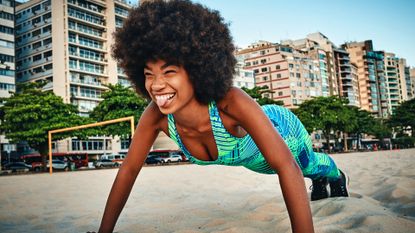
There are many reasons people go on holiday, but usually, they try to get away from the daily grind, relax and indulge themselves. It's almost impossible to avoid weight gain on holiday, or is it? Do your future self a favour and follow the below exercise tips to stay lean while you're away – or at least not put on any more weight.
As travel restrictions loosen worldwide, travel agents and operators are reporting a significant increase in bookings, with travel expected to reach pre-pandemic levels soon. As many move away from a more sedentary lifestyle they may have become accustomed to over the past two years and return to their regular routines, fitness is as important as ever.
Here are some tips from Hila Glick, VP of Physical Therapy & Patient Experience at Virtual Physical Therapy Platform OneStep , about maintaining your exercise routine during your next vacation.
Even if you take some of the tips on board, remember you are on holiday – so don't be too hard on yourself. If you are used to exercising regularly, a vacation is an excellent time to introduce some changes, including your exercise regimen. There are some great ways to do so even during your holiday that don't require special equipment or planning, as explained by Hila below.

1. Walk more
"Brisk walks are wonderful for your health", Hila suggests, "They reduce stress and tension, improve muscle endurance, help you lose or maintain weight and walking while travelling has the added benefit of allowing you to see and experience a new surrounding – be it a city or nature."
She suggests packing and wearing comfortable shoes for walking. Hila's pro travel trip: if you have a backpack, wear both shoulder straps to avoid shoulder and neck pain.
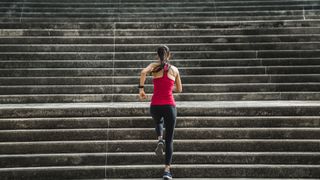
No need to run – walking up steps are equally as good keeping your fitness in check when on holiday
2. Use the stairs
"The hotel elevator may seem enticing but try to use the stairs any time you have a chance", hila says, "Walking up steps uses different muscles from walking on the street, and you should be able to feel those muscles working, and your heart will enjoy a different type of aerobic exercise."
Upgrade to smarter living
Get the latest news, reviews, deals and buying guides on gorgeous tech, home and active products straight to your inbox.
Not to mention, stair workouts use the biggest muscle in your body, the gluteus maximus – a.k.a. your bum muscles – so working it will burn loads of calories. Instant weight loss results!
3. Visit the hotel gym
If you stay at a hotel, they probably have a gym for you to use. Go and visit, won't you?
"If you use the gym back at home, try switching things up with different equipment or exercises", Hila recommends, "Starting your day at the gym will give you more energy, focus and optimism for the rest of your day."
If this is your first time at the gym, remember to go safe: "Usually, there is no instructor, and the equipment can be confusing. Start with something easy like the treadmill and some free weights", Hila adds.

As long as you have access to a fitness app on your phone or watch, you can work out easily, even on holiday
4. Short routines
You may have a jam-packed itinerary of site-seeing and activities, so look for a short exercise and stretching routine on your phone or TV.
"Fitness or physical therapy apps with personal instructors or physicians can also be utilised to personalise your workouts and adjust them to your travelling schedule," Hila says, "In any case, it is best to keep your workouts short and consistent. You can start your day with some strength exercises and end it with stretches, or vice versa. Ten minutes a day will do the job."
5. Try local fitness classes
"If classes are what you are looking for, finding a class you like – be it Yoga, Pilates or Boot Camp – is a fun way to meet new locals and experience something you and your body may or may not be familiar with", Hila suggests, "Some hotels have classes for guests, but if not, many classes have flexible drop-in policies. If you are travelling to a seaside location, a class on the waterfront is always soothing and energising."

Walking on holiday will make you look as cool as the gentleman on this picture
6. Don’t sit around for too long
One final holiday fitness tip from Hila: "If your trip includes time waiting at an airport, make sure you walk while waiting for your flight instead of sitting at the gate. Get creative with other workouts like rolling your suitcase with alternating hands or curling a water bottle."
"If you plan to spend long periods sitting in a car or a plane, plan periodic breaks for some stretching and short walks, either at a rest stop or in the aisles", she says.
It is important to keep your body active, but it's also important to enjoy your vacation. These are just a few ways to utilize downtime when travelling to keep yourself moving without using up precious luggage space or too much of your vacation time.
Matt Kollat is a journalist and content creator who works for T3.com and its magazine counterpart as an Active Editor. His areas of expertise include wearables, drones, fitness equipment, nutrition and outdoor gear. He joined T3 in 2019. His byline appears in several publications, including Techradar and Fit&Well , and more. Matt also collaborated with other content creators (e.g. Garage Gym Reviews ) and judged many awards, such as the European Specialist Sports Nutrition Alliance's ESSNawards. When he isn't working out, running or cycling, you'll find him roaming the countryside and trying out new podcasting and content creation equipment.
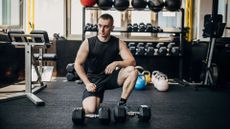
Work your muscles harder by taking your exercises to the floor
By Bryony Firth-Bernard Published 9 June 24

It's currently on sale as well!
By Lizzie Wilmot Published 9 June 24
Useful links
- When is the next Prime Day?
- Best 5G phones
- Best VPN services
- Best laptops
- Best smartphones
- Best mattresses
- Best phone deals
- Best mattress deals
- Best TV deals
- Discount codes
- Jul 21, 2023
Managing Post-Vacation Water Retention: Nutrition and Supplements Guide
Updated: Feb 10

Understanding Water Weight Gain During Travel and Strategies to Regain Balance After Vacation
Vacations are a time to relax, indulge, and explore new places, often accompanied by changes in diet, activity levels, and routine. While these experiences are enjoyable, they can sometimes lead to water retention, causing bloating and discomfort. In this article, we will explore why we often gain water weight while traveling and provide effective strategies to lower water retention and restore balance after your vacation.
Why Do We Gain Water Weight While Traveling?
Several factors contribute to water retention during travel:
Sodium-rich Foods: When traveling, we often indulge in restaurant meals and processed snacks, which tend to be high in sodium. Excess sodium can disrupt fluid balance, leading to water retention.
Dehydration: Traveling, especially by air, can cause dehydration due to the dry cabin air and limited access to water. In response, the body retains water, leading to bloating.
Inactivity: Long hours of sitting during flights or road trips can hinder blood circulation and lymphatic flow, contributing to water retention in the extremities.
Alcohol and Caffeine: Vacation often involves socializing and sipping on alcoholic or caffeinated beverages, both of which can dehydrate the body and exacerbate water retention.
Changes in Routine: A shift in routine can disrupt the body's natural rhythms, affecting hormone levels and contributing to fluid retention.
Lowering Water Weight After Vacation
After returning from vacation, you can take proactive steps to reduce water retention and regain balance:
1. Rehydrate: Start by hydrating your body adequately. Drink plenty of water throughout the day to flush out excess sodium and promote kidney function.
2. Gradually Reduce Sodium Intake: Gradually reduce your sodium intake, opting for whole, unprocessed foods and incorporating more fresh fruits and vegetables into your diet.
3. Balanced Nutrition: Focus on balanced meals that include potassium-rich foods (e.g., bananas, oranges, spinach) to counteract the effects of sodium and promote fluid balance.
4. Limit Alcohol and Caffeine: Cut back on alcohol and caffeinated beverages to prevent further dehydration and its impact on water retention.
5. Gentle Exercise: Engage in gentle exercises like walking, yoga, or swimming to improve circulation and stimulate lymphatic drainage, reducing water retention.
6. Elevate Your Legs: If you experience leg swelling, elevate your legs for short periods to encourage fluid movement back towards the heart.

Supplements for Water Retention
While adjusting your diet and lifestyle can significantly reduce water retention, some supplements may also aid in the process. However, it's crucial to consult with a healthcare professional before adding any supplements to your routine , as they may interact with medications or cause adverse effects.
1. Dandelion Root
Dandelion root is believed to have diuretic properties that can help with fluid retention. It has been used traditionally to promote urination and reduce bloating.
2. Magnesium
As mentioned earlier, magnesium can act as a mild diuretic. It also has numerous other health benefits, making it a valuable addition to your supplement regimen.
3. Vitamin B6
Vitamin B6 may assist in reducing water retention in some individuals. As with any supplement, it's essential to use it under the guidance of a healthcare professional.
4. Potassium
If your diet lacks potassium-rich foods, a potassium supplement might be considered under medical supervision to help balance sodium levels and reduce water retention.
5. Herbal Diuretics
Certain herbs like parsley, nettle, and hawthorn have diuretic effects and might aid in alleviating water retention. However, these should be used cautiously and with professional advice.
Gaining water weight during travel is a common occurrence due to dietary changes, dehydration, inactivity, and altered routines. However, by being mindful of your dietary choices, staying well-hydrated, and engaging in gentle exercises, you can effectively manage water retention and restore balance after your vacation. Consider incorporating natural diuretics or supplements after consulting with a healthcare professional for personalized guidance. Please book a FREE consultation if you are wondering how we can help you achieve your wellness goals!
Schedule a 15 Minute FREE Consultation!
https://calendly.com/jessica-601
Remember, managing water retention after vacation is a gradual process. Be patient with your body as it adjusts back to your regular routine, and celebrate the positive steps you take towards reclaiming your well-being. By following these strategies, you can ensure a smoother transition and enjoy the post-vacation glow without the discomfort of water retention.
_____________
Jessica Mantell M.S., C.N.S., L.D.N.
CEO & Founder of NextGeneration Nutrition

NextGeneration Nutrition believes that better health should be accessible to everyone and that we all are able to improve our health through good nutrition, physical activity, and lifestyle change. We do not support setting shame-based goals but encourages embracing our bodies, genetics, and personality. Our philosophy is abandoning the “One Size Fits All” mentality to create a personalized wellness plan based on your biological makeup and your lifestyle.
For more information connect with us on Social Media or send us a message!
Recent Posts
Discovering Miami’s Best Healthy Eats: A Clinical Nutritionist’s Guide
The Undereating Weight Gain Paradox: Explained
Taming Bacterial Overgrowth: A Nutritionist's Strategy for SIBO Management
Stay Fit and Avoid Weight Gain While Traveling
Six ways to avoid having your next business trip ruin your fitness routine.

Nov. 13, 2013— -- intro: We hear a lot of pleas for help at this magazine, and not all of them come from the interns we occasionally dangle out the window by their ankles. In fact, the most common cry we hear goes something like this: Hey, Men's Health! I have no problem eating right and working out when I'm home. But whenever I travel, I turn into Camryn Manheim. Anything I can do?
To which we'd like to answer: Heck, yeah.
There's a boatload of reasons traveling sabotages even the most disciplined man's eating and fitness habits. Your schedule is disrupted. You're surrounded by gobs of unhealthy food. Your barbells are replaced by a dorky suitcase on wheels. But here's the thing: If you learn to recognize these potholes—and avoid them—you can actually return from your next trip leaner and healthier than when you left. So grab your bags. It's time to learn the new rules of the road.
8 Ways to Cut Fat Without Realizing It
quicklist: 1 category:Avoid Weight Gain While Travelingtitle:The Airport Expands Your Guturl:text:Today, traveling means waiting. And waiting? That means eating. Not only are you within striking distance of the airport food court, but also the normal aggravation you endure when traveling fires up your body's stress hormones—actually making you crave those sugary, high-calorie foods you find at the airport.
The result: A couple of hours in an airport terminal can easily turn into a couple of thousand extra calories in your diet. For instance, munch a Classic Cinnabon while you're waiting at the gate and you've ingested 700 calories. A Starbucks blueberry crumb cake? Another 800 calories. Worst of all, those high-sugar, high-carbohydrate foods are the least satisfying when it comes to reducing your hunger—and the best at spiking blood levels of insulin, a hormone that stimulates fat storage.
Solve the problem: Pack more than your clothes "These days, the food you put in your carry-on bag is every bit as vital as the clothes you put in your suitcase," says Pamela Peeke, M.D., Ph.D., author of Fight Fat after Forty.
So pack travel-friendly foods like snack packs of StarKist Tuna Salad and Crackers, beef jerky, and low-calorie meal-replacement bars, powders, and ready-to-drink shakes like Meso-Tech (muscletech.com). But don't buy just any energy bar. "Instead of your typical carbohydrate-heavy endurance bar or snack, look for one that provides a minimum of 20 grams (g) of protein. It'll be more satisfying," says Dr. Peeke.
quicklist: 2 category:Avoid Weight Gain While Travelingtitle:The Flight Makes You a Blimpurl:text:It's no secret that airplane air is drier than George Hamilton's skin. (With a relative humidity of less than 10 percent, the cabin is twice as arid as the Sahara Desert.) But most travelers don't realize that breathing dry air can turn you into a blimp. "Dehydration due to airline air is a major cause of fatigue, and fatigue gives you a reason to eat," says Dr. Peeke.
Solve the problem: Start drinking and flying Keep your appetite in check with a solid liquidation plan. Drink 8 ounces of water before your flight. More important, bring one 16-ounce bottle of water for every 2 hours you'll be in the air, and down it all before you land.
As for airline food, follow this three-step process when you can: Pass on any food with "pas" in its name—pasta and pastries, for instance; make sure a protein dish (chicken, beef, or fish) is your main entree; and request seconds of any fresh vegetables they serve.
Snacks? Ask for nuts or fruit instead of pretzels and chips. And choose 1 percent milk as your beverage of choice (other than water). Its perfect combination of protein (8 g), carbohydrates (11 g), and fat (2 g) will fill you up and keep you that way better than nearly any other snack.
quicklist: 3category:Avoid Weight Gain While Travelingtitle:Working Out is Hard Workurl:text:At home, fitting in your workout is simple—it's a regular part of that monotonous, my-soul-is-dying rut you call a life. But things are less predictable on the road, and missing a workout can make your belt feel tighter. A review board for the American College of Sports and Medicine found that, on average, men need to exercise at least 200 minutes a week just to maintain their weight.
Solve the problem: Schedule your workout times in advance. That way, the time slot will already be filled when you're invited to an impromptu dinner. Just politely decline, guilt-free, citing a prior engagement.Or try this strategy: "Hire a personal trainer," suggests Ron Rosell, owner of Fit for Business, an online firm specializing in athletic services for business travelers. Not only will you be less likely to blow off the workout, but chances are you'll learn a new workout technique, training philosophy, or cool abs exercise.
If you're staying in an upscale hotel, call the concierge and ask him to contact a trainer for you. Or you can use Sweatime, a service provided by Fit for Business (fitforbusiness.com) that takes care of the scheduling and billing arrangements for you.
quicklist: 4category:Avoid Weight Gain While Travelingtitle:The Hotel "Gym" Is a Jokeurl:text:Many business travelers say it's nearly impossible to find a hotel with a decent gym. Too often, the "state-of-the-art exercise facility" the brochure crows about is a supply closet with a 15-year-old NordicTrack.
Solve the problem: Make reservations without reservation Lack of decent workout space might be the most common travel problem, but it's one of the easiest to solve. Try these tips:
Book the right hotel. Visit fitforbusiness.com. The site rates the top hotel workout facilities in 280 cities around the world and provides a list of hotels that offer free access to local health clubs.
Try this Hotel Room Workout you can do with your carry-on luggage!
Find a gym nearby. Use the Men's Health Gym Finder to locate fitness clubs, health centers, gyms, and sports groups wherever you are traveling.
If all else fails, swim. Even if the hotel pool isn't big enough for laps, just tread water for 14 minutes. Research shows that's enough activity for a 180-pound man to burn 200 calories.
quicklist:5category:Avoid Weight Gain While Travelingtitle:Booze? You Loseurl:text:Frequent business travel can drive a man to drink—especially if he's on an expense account. That's okay occasionally, but if you make heavy drinking a nightly habit, you'll max out your pants faster than you do the company credit card. "Besides being packed with extra calories, alcohol compromises your willpower. So you're less likely to stick to your eating plan," says Althea Zancosky, R.D., an American Dietetic Association spokeswoman in Philadelphia.
Indeed, toss down four or five drinks and you're logging the caloric equivalent of a slice of cheesecake and an 8-ounce sirloin. Worse, you'll be more likely to order the cheesecake.
Solve the problem: Put a governor on your alcohol intake—and your appetite Remember, you're on business, not vacation, so drink as you would at home. When you're out with clients or business associates, make friends with Tom Collins and Bloody Mary. Each has fewer than 130 calories.
Take control of your food intake by ordering lean meats—chicken, fish, steaks with "loin" in the name. They're rich in protein, which makes you feel full while you're eating. And they're not easily upsized. Round out your meal with a house salad and a side of vegetables.
quicklist:6category:Avoid Weight Gain While Travelingtitle:Minibars Create a Mega-Youurl:text:Hotels may be the worst diet trap since Thomas Jefferson introduced french fries to the American colonies in the late 1700s. Room service offers high-calorie, restaurant-quality food delivered straight to your door and charged to your room, no cash needed. And the minibar isn't an amenity, or a "bar" at all.
It's an evil little fat-making refrigerator with prices that make the $1.25-per-local-call charge seem cheap. Solve the problem: Sabotage the system. Make room service and that damnable fridge work for you, instead of against you.
Don't open the room-service menu. "You're more likely to eat what you should if you're not sidetracked by a slew of exotic choices," says Elizabeth Somer, R.D., author of Food and Mood. Instead, simply order a grilled chicken breast, salmon steak, or sirloin with a side of steamed vegetables. "They'll be happy to make it for you."
Make a preemptive order. Once you've settled in, place an order for a plain turkey sandwich, no chips, with the mayonnaise on the side. Then tuck it away in the refrigerator in case you feel the need to feed later that night (or don't have time to stop for breakfast the next morning).
Create your own minibar. Ask the concierge for directions to the nearest convenience store and pick up easy-to-eat-foods like yogurt, fruit, and lunchmeat. When you shop for your own snacks, you'll be more likely to choose them over the ones supplied by the hotel.
Trending Reader Picks

Girl killed by badminton racket
- Jun 10, 7:51 PM

Trump, Biden tied in 538's new election forecast
- Jun 11, 8:05 AM

New Jersey reviewing Trump clubs' liquor licenses
- Jun 10, 5:24 PM

Austrian Airlines plane loses nose in hailstorm
- Jun 9, 7:07 PM

How Trump’s conviction will impact the election
- May 30, 5:23 PM
ABC News Live
24/7 coverage of breaking news and live events
- The Healthy Voyager Travel Show
- The Healthy Voyager’s Global Kitchen
- The Healthy Voyager’s TV Guest Appearances
- Healthy Voyager Radio
- Dressings & Sauces
- Kid Approved
- Soups & Salads
- Latin America
- Middle East
- Entertainment
- Fashion & Beauty
- Healthy Voyager Approved
- Product Reviews
- Health & Beauty News
- Mind + Body
- Relationship Corner
- Weight Loss
- Women’s Health
- About The Healthy Voyager
- Work With Me
- Disclosure and Privacy Policy
- Entrepreneurial and Business Coaching
- Travel Industry Consulting
- Restaurant, Bar and Food Service Consulting
- Wellness Coaching
- Financial Coaching
- The Healthy Voyager Holistic Travel Supplement Product Line
- Healthy Voyager Merchandise
- The Healthy Voyager’s Trunk Clothing Rental
- The Healthy Voyager’s Apothecary
- When Cris Met Kringle
- Travel Credit Card Referral Bonuses

8 Ways To Stay Healthy And Prevent Weight Gain While Traveling
- December 30, 2021
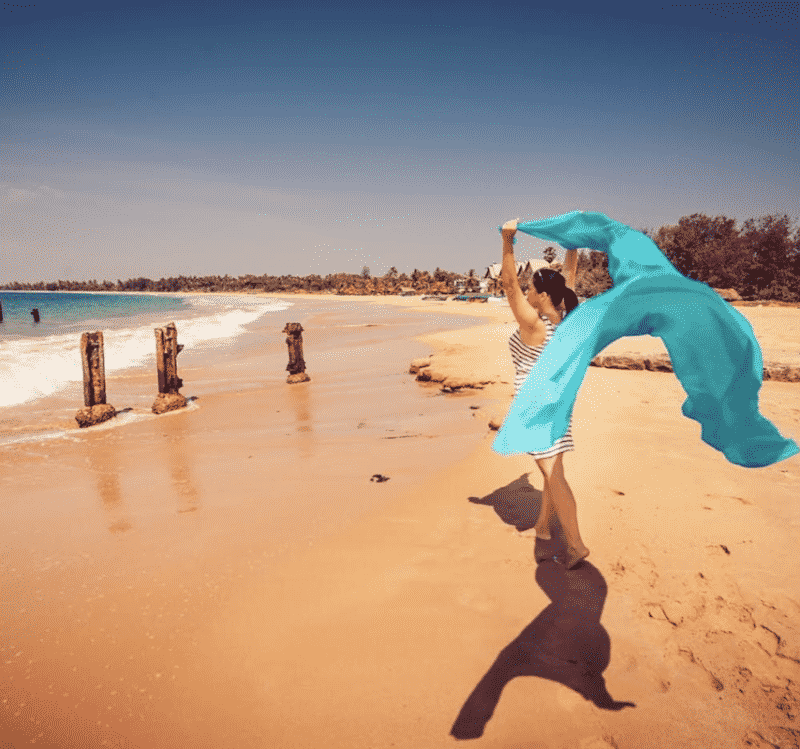
When you’re on vacation or traveling for work, it’s hard not to let loose and indulge in everything that the destination has to offer. But when you get back home, all those indulgences will catch up with you – especially if you didn’t take care of yourself while away. You might feel tired or sluggish because of jetlag or just from being out in the sun too long. Or maybe your clothes are feeling a little tight around the waistline because of all that delicious food and drink. Either way, it’s never fun coming home afterwards and facing the consequences of your actions. Here are some tips that will help you stay healthy during your travels!
1: Meal Kit Boxes
It’s great to explore a new place and try all the different foods that you can. But sometimes, it’s difficult to find healthy or nutritious foods that are easy to make or prepare. Meal kit boxes help with this because they give you everything that you need for a complete meal in one box! These pre-prepared meals have been carefully selected, prepared and packaged to make them ultra-convenient. You can find meal kit boxes for almost any cuisine or theme – it’s the best way to eat healthy when you don’t have time to choose what to cook and prepare a full meal from scratch. You can take a look at a Fresh and Easy Review to find out more about why meal kit boxes are the best. They really are a game changer that will have you cooking the tastiest meals in no time.
2: Drink Lots Of Water
Dehydration is a major problem when you’re traveling, especially when you’re in a hot and/or humid climate. The weather itself can be dehydrating, but many people let themselves get dehydrated because they don’t drink enough water or other fluids such as natural juices and herbal teas.
It’s important to stay hydrated – your body needs the extra water to keep your body temperature down and also to help with digestion. If you’re not used to drinking a lot of water, then it might be difficult for you at first. Drinking water also cleans your mouth and prevents plaque build-up. If you notice a sticky yellow film on your teeth, you should increase your fluid intake and make your teeth feel good at a dentist in Cordova by booking an appointment. Start by adding more water into your diet and drink it regularly throughout the day so that your body gets used to it. Just remember – you need extra fluid when you travel because you might be more active and in a different climate. Keep in mind that you should drink even more water when the weather is particularly hot or humid because it’s easy to become dehydrated when you’re outside for long periods of time.
3: Take Supplements For Nutrients And Electrolytes
When you’re away, it can be difficult to keep your intake of important nutrients such as vitamin C, calcium and magnesium up. These nutrients are essential for everything from maintaining healthy skin and hair to supporting brain function and good digestion.
If you can’t get enough of these nutrients through your diet or food supplements, then consider taking third-party supplements before, during and after your trip. Check out a post about multivitamin pills for more information.
4: Avoid The Main Source Of Infections
Food is often the main source of illness while you’re traveling, so be careful about what you eat or drink. It’s easier to get sick from food because it isn’t always prepared in sanitary conditions. Staying away from raw foods such as salads and uncooked fruit will reduce your risk of getting ill from food poisoning. Also avoid tap water – even if you have a filter on your faucet or bottle, there are some cultures that use unfiltered tap water to prepare their food! If you can’t avoid drinking unfiltered tap water, try to ingest only the liquid part without mixing it with other ingredients.
5: Try To Get Some Exercise
You might be sitting down for long periods of time while you’re traveling, but there’s always the option to take your mind off the food by taking some exercise . You don’t have to go to a gym or go on a strenuous run – just get out and about to explore the surroundings every chance you get! Even if it’s just going for a walk around town before dinner, getting some exercise will help keep your blood flowing and boost your mood so that you feel more energetic during the day.
6: Eat Breakfast Every Day
Another tip is to eat breakfast every day. It doesn’t matter if it’s complex carbohydrates or protein shakes – what matters is that you start your day with something substantial provides energy throughout the entire day. This will also help you avoid overeating at lunch time or picking up snacks along the way. When you’re famished, it’s so easy to eat whatever is available without thinking about whether it’s actually good for you!
7: Carry Healthy Snacks With You
Carry some healthy snacks such as nuts, fruit and granola bars with you at all times to avoid overindulging if you get hungry. This will keep your blood sugar stable so that you won’t be craving something unhealthy. Also, traveling can take a lot out of your schedule so it’s important to keep yourself energized so that you can stay active without feeling fatigued all the time.
8: Make Sure You Get Enough Sleep
Finally, make sure that you get enough sleep. Travelling can be stressful and exhausting and it’s even more difficult to relax when you’re in a new environment. It isn’t always easy to fall asleep when there are so many things going on around you, but your body needs the rest in order to reset itself.
The tips we’ve provided should help you stay healthy and prevent weight gain while traveling. The first step is to drink enough water, take supplements for nutrients and electrolytes, avoid the main source of infections (food), carry some healthy snacks with you at all times, make sure that you get enough sleep as well as eat breakfast every day.
Related Posts:

Carolyn Scott-Hamilton
The Healthy Voyager, aka Carolyn Scott-Hamilton, is the creator and host of The Healthy Voyager web series, site, and overall brand. An award winning healthy, special diet and green living and travel expert, holistic nutritionist, plant based vegan chef, best-selling cookbook author, media spokesperson, sought after speaker, consultant and television personality, Carolyn Scott-Hamilton is a respected figure in the world of healthy lifestyle and travel as well as special diet cooking and nutrition. The Healthy Voyager aims to help people live well, one veggie at a time!
Leave a Reply
Your email address will not be published. Required fields are marked *
This site uses Akismet to reduce spam. Learn how your comment data is processed .
Input your search keywords and press Enter.
Privacy Overview
The Weird Way Traveling Can Lead to Weight Gain
It’s all in your gut.

Jet lag can make you feel fatigued, queasy, and like your head is banging out a killer drum solo. But now, a study published in Cell reveals that it may also be linked to weight gain link: Hopping time zones messes with your gut microbes’ circadian rhythms, according to the new research.
To determine what effect jet lag has on the gut microbiome (the bacteria that make up the community of microbes in your stomach), researchers from the Weizmann Institute of Science in Israel analyzed fecal samples collected from both mice and humans (yuck). They found that the bacterial colonies and their biological activities changed depending on the hour. Then, to mimic jet lag, the researchers switched up the mice’s light-dark schedules as well as feeding habits.
The result: The bacteria lost their normal rhythms and even changed in composition, and the mice gained weight and developed metabolic complications linked to diabetes. What’s more, when the researchers examined the microbiome of two people who traveled from the U.S. to Israel, they found that it had changed, supporting the growth of obesity- and metabolic disease-linked bacteria. Crap.
While the study didn’t search for ways to combat the effects, researchers are hopeful that, in the future, treating gut bacteria with probiotic or antimicrobial therapies may reduce or prevent jet lag from spurring weight gain.
More from Women’s Health : The 9 Best Probiotics For Your Health 7 Foods That Are Crucial for a Healthy Gut Can Probiotics Help You Lose Weight?

How To Lose Weight

5 Ways To Speed Up Your Metabolism, Per Experts

Can Your Stomach Really Shrink? Doctors Weigh In
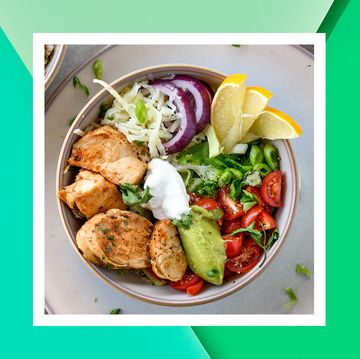
9 Best Keto Meal Delivery Services, Per Experts
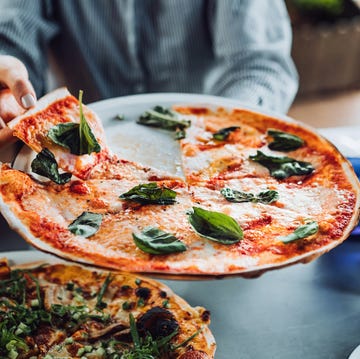
Should You Cut Carbs To Lose Weight?

How To Calculate A Calorie Deficit For Weight Loss

The Pritikin Diet, Explained By Nutritionists
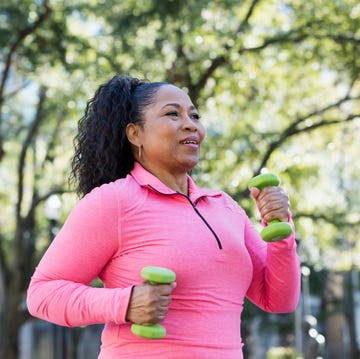
How To Get Rid Of Belly Fat Safely, Per Dietitians

What Is The Metabolic Confusion Diet, Exactly?

Khoe Kardashian Weight Loss: Diet, Workout Routine

Is It Ever Safe To Lose Weight While Pregnant?
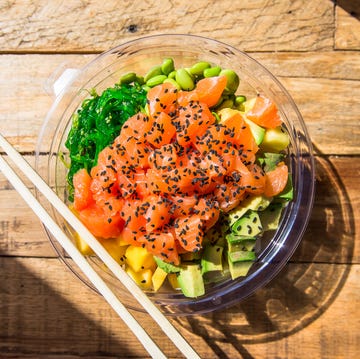
How To Calculate Your Optimal Protein Intake
3 Reasons You Gain Weight on Vacation (And You’re Gonna Be Fine!)
- Mark Fisher
- Health , Nutrition , Science Nerd Alert
If you come home as happy as you leave, you have had a good vacation. – Unknown
We all need time to relax and reinvigorate ourselves. Usually that can be accomplished on the weekend. But sometimes, it can’t. And that’s why we have vacation. Some people need sun and sand to unwind from their daily grind. Others find the tranquility they seek in the warble of mountain streams.
Realizing you have to come home from vacation is never fun. But coming home from vacation and noticing that you’ve gained weight while away can send you into an emotional tailspin.
Is it possible that you gained “ that ” much weight while in Cabo? What kind of reckless idiot possessed me while I was in the Finger Lakes? Oh God, should I never take a vacation again? Am I going to have to start all over on my #weightlossjourney? The answer to all of those is, no.
No: You didn’t gain “all that.” No: You are not a reckless fool. No: You can take a vacation again.
And no, you won’t have to start your journey over again. Weight gain on vacation isn’t necessarily a big deal. If it happens to you, don’t worry, it’s not all doom and gloom. You haven’t turned into Thanos and snapped away all your hard work. The majority of weight gain on vacation can be attributed to three factors.
1. Sodium, Sodium, Sodium
Alright Ninjas, are you ready for some science? Don’t worry, there won’t be a test or anything. And this isn’t gonna end up like high school biology where I tell you to rummage through an owl’s poop to see what it’s eaten, nor are we touching the whole dissecting a frog thing. Frogs are gross and slimy and… yuck!
Anywho, biology (and chemistry) are happening every second of the day inside your body. The food you eat influences how your body carries out its biological and chemical processes. Ever get gassy after you eat a bunch of beans? That my friend is science happening in your intestines.
There are dozens of nutrients that are crucial to your biology. For instance, your muscles and neurons are electric tissues within your body. And minerals like sodium, potassium, chloride, magnesium, calcium, and phosphate, aka electrolytes, have the ability to conduct electricity (via ions) which allows your cells to communicate.
For instance, without sodium, your muscles won’t be able to contract. And without contraction, you’d never be able to walk, dance, ride a bike, swing a kettlebell, and your intestines couldn’t digest your food.
Of course, there’s a delicate balance with these electrolytes. And your body secretes hormones that help maintain electrolyte homeostasis. But my focus here is on the interaction between sodium and potassium; these two electrolytes are the main “communicators” or drivers of muscle contraction.
If your body were to operate optimally, it would maintain a higher concentration of potassium ions to a low amount of sodium ions. So if you increase your sodium intake you’d offset the intra-cellular balance of your cells. And one way to increase your sodium intake is to eat meals at restaurants.
Salty Science
The American Heart Association, in their journal Circulation , reported that restaurants and processed foods in groceries accounted for 70% of dietary sodium intake. When at home, they found that people used far less salt overall. So if you’ve been eating more home cooked meals before you go on vacation and then chow down at restaurants, you could be taking in anywhere from 3-4x (maybe more?) the amount of sodium you normally consume.
Yea, that’s gonna muck up your sodium/potassium balance for sure. Sodium causes your body to hold onto more water. Hello, bloat. But if you’ve offset the sodium/potassium balance, and let’s be honest, you’re probably not eating that many potassium-rich veggies on vacation, your body is gonna take a while to bring your sodium levels back in line.
Water weight is the most common cause of the scale increasing. And if you’ve eaten out a lot on vacation, then you can blame the extra salty foods you ordered. But sodium isn’t the only nutrient that can increase water retention. There’s a major macronutrient you eat every day that causes excess water gain: carbs.
2. Glycogen Plus Water = Thirsty Carbs
Mmmm, carbs. What do you think of when you think of carbs? Pizza, pasta, bread, cookies, cake — have I made you salivate yet?
For far too long, carbs have been demonized as the culprit of obesity. But carbs aren’t some demonic force hellbent on increasing your waist size. You need carbohydrates for your body to function. And even though your body can create ketones for energy, ketosis isn’t an optimal biological process.
Your body would much rather use glucose as fuel. In fact, your brain consumes roughly 120g of glucose every day (that roughly equates to about 420 calories). When you eat carbohydrates, your body converts those carbs into glucose to fuel your brain and your muscles when you’re working out.
Can You Hear Me Now?
Are the light bulbs going off yet? If you’ve been in a calorie deficit for awhile, you might have noticed that your workouts sometimes feel sluggish. This is something that happens when anyone is on a low-carb diet. But besides giving your body more glucose, increased carb intake will increase the water you store, along with refilling your muscles glycogen stores.
Your body stores excess glucose as glycogen in your muscles (about three-quarters of all your body’s glycogen stores are in your muscle) and liver. And guess what holds that glycogen there? Mother freaking water.
Decreasing your carb intake means you’ll not only lose the fuel stored in your muscles, but you’ll also lose water. So if you drastically increase the carbs you’ve been eating, you’ll see the scale tick up. But that tick up is due to refilling your muscle glycogen along with holding onto extra water.
So that French toast you ordered at brunch on vacation and then covered in maple syrup didn’t go straight to your butt or belly. But it did store some extra water and refill glycogen stores.
There is one final thing that can cause you hold onto extra fluids and tick the scale up. And it’s something that few of us ever consider.
3. Inflammation
Changes to your normal diet can cause you to hold onto extra water. But there are other factors that can cause weight gain via fluid retention. And one that is common but often overlooked is inflammation.
Inflammation isn’t necessarily a bad thing. In fact, it’s how our bodies begin the healing process. And you experience “some” inflammation every time you workout — you lift weights, break down muscle(s), and your body has to repair your muscle(s) so you can come back stronger or better the next time. Outside of getting sick or an injury that causes inflammation, there are other ways your body might get inflamed and thus hold onto more fluids.
Alright, don’t hate me, but one common cause of inflammation can come from alcohol. A 2017 review of multiple studies on alcohol and gut-inflammation found that there’s significant evidence that higher intake of booze can lead to massive disruptions of your gut biome.
This review showed that moderate drinking, which the US Department of Health and Human Services defines as one drink per day for women and up to two drinks per day for men, showed no signs of deleterious effect on gut health.
But higher alcohol consumption, and this was especially true with those who had an alcohol use disorder, can lead to intestinal permeability. This increase in permeability can allow larger molecules through your intestine and into your bloodstream, and kicks your immune system into “fight mode.”
There’s a lot in that study about how alcohol affects your gut over time. They cover a ton of information about how alcohol can change your gut flora, how it can affect those with IBD, and may have some effect on whole body inflammation as well. So if that intrigues you and you wanna know more, and don’t mind reading a few studies, check it out here.
But alcohol isn’t the only thing that can cause inflammation and subsequent storage of extra fluids.
Lather Up to Reduce Inflammation
If you’re heading to somewhere warm and sunny, make sure to lather up with plenty of sunscreen. Especially if you’re a ginger like me. Sunburns, especially extreme ones, can cause inflammation. But the sun is just one aspect of the environment that can cause your body to react and kickstart inflammation.
Have you ever traveled and while on your trip or when coming back gotten sick? Sure, being in a tube 30,000 feet in the air filled with people who could have germs you don’t know about can be a cause of getting sick. But wherever you are heading on vacation, it’s possible too that there are toxins you’re breathing in every day that can lead to getting sick or that can cause inflammation elsewhere in your body.
Mold, dust mites, smoke or smog, all of these things can affect your lungs and could cause your immune system to kick in. Even the food you eat while you’re away could affect your stomach and introduce toxins or substances you don’t normally consume that could be an irritant to your system.
Of course, some mild inflammation due to your immune system may not cause massive amounts of weight to spike, but if it’s combined with extra carbs and sodium, then you know there’s a three-prong attack happening inside your body.
A couple final things that many of us may have noticed on long trips is swelling of your ankles or hands. Some climates can cause you to swell. Ever been to somewhere super hot and noticed your hands swell up?
Yea, heat can do that to you. You can also experience swelling and fluid retention after sitting in a plane for hours on end. Compression clothing can alleviate or prevent that, as can walking about the cabin or stretching in the toilet. But just be aware that if you hop on a scale in a hotter climate or after getting off a long plane ride, you might notice a tick up.
Take a Break: Vacay is GOOD!
Vacation should be a time to recharge and refill your cup. You can always choose to take a “break” from your healthy habits and enjoy yourself on vacation in regards to food. But know that by making that choice, you may see the scale go up a bit.
It’ll come down once you get back to your normal routine. So you don’t need to do a cleanse or anything drastic. Get back to your normal. Maybe that normal means eating plenty of veggies and lean protein for a week. Or maybe it means taking those extra carbs and using them to get back in the swing of things at MFF. Breaking vacation mode can be hard.
But remember: you’re always one meal, or one class, away from being back on track.
And if you haven’t found the right track for you to get on, there’s a magical place you can visit. It’s kind of like a vacation from everyday life (at least for an hour). Getting there is simple. All you have to do is come by the Mark Fisher Fitness Enchanted Ninja Clubhouse of Glory and Dreams.
Ready to get back in the swing of things with your fitness after some much-deserved time off? Your first 5 classes at Mark Fisher Fitness are only $49!
SIGN UP NOW
Robbie Farlow is the King of the Gingers, Protector of the North, and an uber nerd who loves all things Star Wars, video games, Marvel, and 90s music. Oh, and tacos and whiskey. He’s an online fitness coach who helps men and women make their 30s better than their 20s. And he writes about all things nerd, lifting weights, emo music, and more at Side Quest Fitness . When he isn’t writing, you’ll find him playing video games, deadlifting, munching on tacos, snuggling on the couch with his wife, and drinking good whiskey.
READY TO GET STARTED?
Schedule a free class to catch the vibe.
- [email protected]
- (917) 983-0631
- 411 W. 39th Street, New York NY 10018
© 2024 Mark Fisher Fitness. All Rights Reserved. A Kilo Website
Fill out the form below to get started with a free class!

The 6 Best Ways To Manage Perimenopausal And Menopausal Weight Gain, According To Experts
Y our body goes through *significant* hormonal and metabolic changes as you head towards menopause, so if you have big questions, you’re not alone. But sometimes, talking about the big M, which most women experience between 45 and 52, can feel like you’re back in Sex Ed, with more questions than answers. It’s important to educate yourself on what to expect during perimenopause and menopause , because symptoms can sneak up while you’re still getting your period . One of the biggest (and peskiest) is weight gain.
“Natural menopause typically occurs in your mid-40s, around the same time that women may notice changes in their ability to control their weight,” says Elizabeth Ward, MS, RDN, co-author of The Menopause Diet Plan: A Natural Guide to Managing Hormones, Health and Happiness .
While it’s hard to determine if menopause, aging, or a sedentary lifestyle is to blame, menstrual cycle changes mean declining estrogen levels, which is associated with increased belly fat , Ward says. (It’s not totally clear why this happens, but, on average, belly fat increases from 5 to 8 percent of total body fat during the premenopausal phase, and 15 to 25 percent afterward, one study found.)
But it doesn’t have to be this way. You can still manage your weight with tried-and-true tactics. “There aren’t any ‘hacks’ for long-term weight loss,” notes Neil Paulvin , DO, a board-certified family medicine and regenerative medicine doctor. “Overall, it's important to intentionally change your habits as your body changes within."
Meet the experts: Elizabeth Ward, MS, is a registered dietician nutritionist and a co-author of The Menopause Diet Plan . Neil Paulvin , DO, is a board-certified family medicine and regenerative medicine doctor. Melie Purdon is a yoga instructor with YogaRenew Teacher Training. Marissa Roy is fitness trainer, coach, and owner of Permanent Change Coaching .
Wondering how to lose weight and fight weight gain during perimenopause and menopause? The experts here have tips to help you feel your best, strongest, and most confident self during this transformative stage of life.
Up your protein intake.
Once you hit perimenopause, you'll likely need to change up your diet. As women age, their bodies don’t handle protein as efficiently , so it's best to start increasing your intake. “Protein is important to make and preserve muscle tissue, which is a metabolic powerhouse that protects against several chronic conditions, including type 2 diabetes,” says Ward. Plus, protein helps you feel fuller longer.
A sedentary, 150-pound woman should consume roughly 55 grams of protein per day, or about 18 grams per meal . Ultimately, if you want to see the numbers on the scale return to your baseline, up your protein intake.
“ The ideal eating plan at this stage of life is typically higher in protein—at least 25 to 30 grams at every meal and seven to 10 grams in snacks," says Ward. Also think about watching your intake of foods with simple carbohydrates like chips, ice cream, and cookies, and eat a diet rich in fiber (about 30 grams a day) and with moderate amounts of healthy fats, she adds.
Not all protein is created equal . Ward suggests adding in lean sources of animal protein, which tend to be richer in leucine, a muscle-building amino acid. “You need leucine and adequate protein in the diet to make and preserve muscle tissue, which also provides a somewhat greater calorie burn 24/7,” says Ward.
But upping protein also means scaling back elsewhere. “When you add more protein, you need to cut back on carbs, fat, or both, and it usually works out that women are [already] eating too many carbs and fats and not enough protein,” says Ward. “You can't just add protein because it will probably result in weight gain or no weight loss.”
Strength train and lift weights to burn more at rest.
Strength training is the one of the best things you can do to boost your metabolism and prevent perimenopausal and menopausal weight gain, according to fitness trainer and coach Marissa Roy, owner of Permanent Change Coaching . Your muscle proteins have estrogen receptors, so as estrogen levels decline, you need extra strength training to maintain your muscles. Ward recommends doing strength-focused workouts at least twice per week, lifting a bit heavier and doing fewer reps.
“This doesn't need to mean pushing 300 pounds on a barbell around, but it does mean learning how to safely and effectively use weights in the gym, and train to build muscle and get stronger,” says Roy. “This will increase muscle mass, bone density, and therefore, metabolic rate, protecting the woman's metabolism against weight gain or rebounding after a weight-loss diet.”
You can also boost your metabolism by following the "progressive overload" principal, or gradually increasing the weight and reps in your routine, Roy explains.
Just getting started? Know your baseline and build up to a new target. If you’re a total newbie, you might even opt for a session or two with a trainer at your gym. Ideally, Roy recommends starting with roughly six to 15 reps to build up your muscle strength. “The most important factor is making sure that you progress week-by-week, and you're actually getting stronger,” he says.
Focus on micro-movements that target your core.
Certain types of activity may be more beneficial for your body once you hit perimenopause and start moving into menopause. “Think low-impact cardio, with more focus on micro-movements to really target the deep core and keep the articulations strong and flexible," says Melie Purdon, a yoga instructor with YogaRenew Teacher Training .
Targeting your midsection during a workout can be tricky, but Purdon says the micro-movements and abdominal breathwork in yoga or Pilates can be super beneficial, targeting deep core muscles that aren’t always activated.
“When you use all the muscles that are part of a well-rounded breath, you target the transverse abdominis, which are the deepest layer of abdominals,” says Purdon.
The key is building strength from the inside out—which benefits everything from breathing patterns, to back pain and posture, Purdon continues. "You will be more efficient in your other types of workout and begin to see results in the shape of your belly.”
Take workouts slow and steady.
You shouldn't go from couch hero to treadmill queen in one day. Roy has been working with menopausal women since 2016 , and she says suddenly throwing yourself into a bootcamp or intense HIIT class isn't the answer to menopausal weight gain.
You might hurt yourself if you put your body through these types of workouts without proper prep. “When sex hormones tank and menopause hits, it becomes incredibly easy for women to lose muscle mass and become prone to breaking bones, falls, and aging quicker,” says Roy.
If you're looking for a little cardio boost, try incorporating mini-movement breaks during your day. Think walking around your block or doing jumping jacks between episodes of Ted Lasso . “It's not always enough to go to the gym—look for ways to ‘snack’ on exercise throughout the day, such as taking five minutes out of every hour to move around,” says Ward.
Speak with your doc about a vitamin D supplement.
As it turns out, keeping pounds off may be linked with maintaining adequate vitamin D levels , because low vitamin D levels are related to the suppression of a hormone that fights fat accumulation. So, Ward says it’s crucial for women to get 15 micrograms every day.
It's hard to hit recommended vitamin D levels through diet alone, especially as you age, so Ward also suggests looking into supplements.
Note: The science world is not totally on the same page about this vitamin. A 2020 review of 20 randomized controlled trials showed that vitamin D supplementation had no effect on BMI or waist circumference in healthy adults , even those considered overweight or obese.
Again, it’s all about what works for you and understanding that weight loss does not have one magic bullet solution.
Prioritize sleep.
A solid sleep cycle is essential to reaching most health goals, and weight control—especially during perimenopause and menopause—is no exception. “When you sleep poorly, it's hard to muster the energy to plan healthy meals and to exercise because you're just too tired,” says Ward.
Unfortunately, perimenopause and menopause symptoms ( like hot flashes ) can make good sleep difficult. But there are ways to set yourself up for success. First, avoid sugary foods at night, Ward says. Yes, a scoop of late-night ice cream really hits the spot when Succession comes on, but you process carbohydrates better earlier in the day, and sweets after dinner can spike blood glucose levels, making it harder to fall asleep.
Second, pay attention to your natural melatonin levels. The "sleepy" hormone is actually present in cherries, grapes, strawberries, salmon, eggs, legumes, pistachios, peppers, and mushrooms, so Ward says you can increase your supply by incorporating these foods into your diet.
Ultimately, your body is working hard to transition you to a new (and exciting!) phase of life. So, don't be too hard on yourself. These tips can help you feel your strongest, but finding what works best for you may require some experimentation and willingness to try new activities, as well as personalized advice from a doctor who knows you.

Official websites use .gov
A .gov website belongs to an official government organization in the United States.
Secure .gov websites use HTTPS
A lock ( ) or https:// means you've safely connected to the .gov website. Share sensitive information only on official, secure websites.
7 Common Withdrawal Symptoms
And What You Can Do About Them
Trying to quit smoking feels different for each person, but almost everyone will have some symptoms of nicotine withdrawal. When you stop, your body and brain have to get used to not having nicotine. This can be uncomfortable, but nicotine withdrawal can’t hurt you – unless you give in and have a cigarette!
Over time, withdrawal symptoms will fade as long as you stay smokefree.
1. Having urges or cravings to smoke
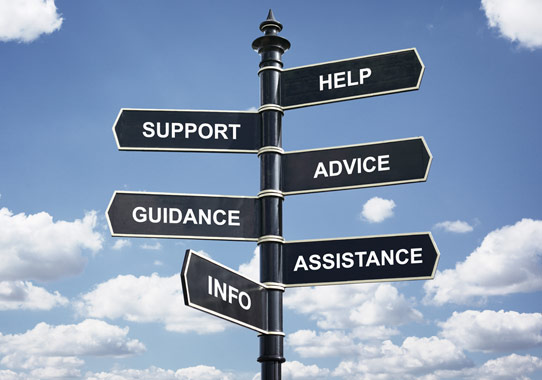
Almost everyone who smokes regularly has cravings or urges to smoke when they quit. They may be mild or can sometimes feel overwhelming. Figuring out how to deal with cravings is one of the most important things you can do to stay successful.
Ways to manage: There are LOTS of things you can do to make urges and cravings less of a problem. Quit-smoking medicines can help a lot, and so can other quitting tips . Cravings can be triggered by things that make you think about smoking—like people you smoked with, a place you often smoked, or things you used to do while smoking like having a cup of coffee. Even a thought or a feeling can trigger a craving. But other thoughts can help you get through a craving, like remembering why you are quitting. Remember that you never have to give in to a craving, and that it will always pass.
- Use a quit-smoking medicine.
- Keep busy and distract yourself.
- Be active – some physical activity is better than none!
- Spend time with friends who don’t smoke.
- See other ways to manage withdrawal .
2. Feeling irritated, grouchy, or upset
It is very common to feel irritated or grouchy when you quit. Even many people who have never smoked know this is part of quitting. Knowing this is normal can be helpful.
Ways to manage: Remind yourself that you likely feel this way because your body is getting used to being without nicotine. Take a few deep breaths and remind yourself why you’re quitting.
3. Feeling jumpy and restless
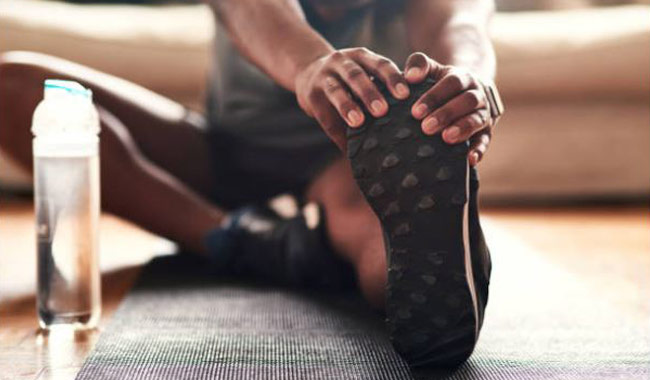
Feeling jumpy or restless during the first days or weeks after quitting is normal. Just like your mind gets irritated without nicotine at first, the rest of your body can, too.
Ways to manage: Doing some physical activity can help shake loose your jumpiness. Get up and walk around for a bit if you feel restless. Try cutting back on coffee, tea, and other caffeinated drinks. When you quit smoking, caffeine lasts longer in your body.
4. Having a hard time concentrating
You may notice that it is harder to concentrate in the first days after you quit—this is very common.
Ways to manage: Try to cut yourself some slack, especially in the first days after you quit. Try to limit activities that require strong concentration if you can.
5. Having trouble sleeping

It’s common to have some trouble sleeping when you first quit smoking. This will get better, but if it is bothering you, talk with your healthcare provider to get help. If you become exhausted from poor sleep, this can make it harder to stay quit.
Ways to manage:
- If you drink coffee, tea, or other caffeinated drinks regularly, don’t drink them in the late afternoon or evening. When you quit smoking, caffeine lasts longer in your body.
- If you are using the nicotine patch, try taking it off an hour before bedtime. Sometimes the nicotine in the patch can affect your sleep.
- Don’t watch TV or use phones, computers, or e-books in bed.
- Make sure your bedroom is quiet, dark, relaxing, and at a comfortable temperature.
- Don’t eat a heavy meal or drink alcohol right before bed.
- Add in some physical activity during the day (but not right before bed).
- Go to sleep and wake up around the same time each day, even on weekends.
6. Feeling hungrier or gaining weight
It’s normal for your appetite to increase some when you quit. And your body may not burn calories quite as fast. You may also eat more because of the stress of quitting or to have something to do with your hands and mouth. Food may even be more enjoyable because your senses of smell and taste are not being dulled by all that smoke!
Ways to manage: While some people may gain weight after they quit, it’s important for your health to quit sooner than later. Below are a few simple things you can do to help control weight gain after quitting. The bonus is that these things will help you build healthy behaviors for a lifetime of being smokefree!
- Snack smart. If you eat between meals, find some healthy, low-calorie foods that still give your mouth and hands something to do, like celery, carrots, or sugar-free mints. You can also keep your hands and mouth busy with a toothpick or a straw.
- Be active. Any physical activity is better than none. Even if you don’t want to join a gym or take up running, simply going for a walk can have real health benefits!
- When you eat, focus on eating. Eating is often something we do in the background while we watch TV or check our phones. When we eat like this, we eat more. When you quit smoking, make a point of removing distractions when you eat. Also try eating a bit slower and focus on enjoying your food. This can help you notice when you are getting full.
If you are worried about gaining weight , a quit coach can help you with other quitting tips , or you can talk with your healthcare provider for help.
7. Feeling anxious, sad, or depressed

People who smoke are more likely to have anxiety or depression than people who don’t smoke. Some people feel mood changes for a short time after they quit smoking. Watch for this, especially if you’ve ever had anxiety or depression.
For some people, smoking may seem like it helps with anxiety or depression, but don’t be tricked. Smoking might make you feel better in the short-term, but that’s because the nicotine in cigarettes stops the discomfort of withdrawal, not because it is helping with anxiety or depression. There are much better ways to deal with withdrawal symptoms and mood changes than returning to smoking! The good news is that once people have been smoke-free for a few months, their anxiety and depression levels are often lower than when they were smoking.
- Be Active. Being physically active can help lift your mood. Start small and build up over time. This can be hard to do if you’re feeling down. But your efforts will pay off.
- Structure your day. Stay busy. Get out of the house if you can.
- Connect with other people. Being in touch or talking with others every day can help your mood. Try to connect with people who are supportive of your efforts to quit smoking.
- Reward yourself. Do things you enjoy. Even small things add up and help you feel better.
- Talk with a healthcare provider. If you don’t feel better in a couple weeks, or your symptoms feel unmanageable, it’s important to contact a healthcare provider.
What if feelings of depression get worse, or don’t get better? You should get help . Talk to your healthcare provider, call the quitline ( 1-800-QUIT-NOW ), or seek appropriate emergency help.
- Call or text the 988 Suicide & Crisis Lifeline at 988 , available 24 hours a day, 7 days a week. Online chat external icon is available 24/7.
- Call 911 or go to the nearest hospital emergency department for emergency medical treatment.
- Don’t be alone. Don’t leave another person alone if he or she is in crisis.
To receive email updates about this page, enter your email address:
- Smoking & Tobacco Use
- Smokefree.gov
- National Cancer Institute
Exit Notification / Disclaimer Policy
- The Centers for Disease Control and Prevention (CDC) cannot attest to the accuracy of a non-federal website.
- Linking to a non-federal website does not constitute an endorsement by CDC or any of its employees of the sponsors or the information and products presented on the website.
- You will be subject to the destination website's privacy policy when you follow the link.
- CDC is not responsible for Section 508 compliance (accessibility) on other federal or private website.
Pregnancy Weight Gain Calculator
Medical review policy, latest update:, how much weight should you gain during pregnancy and what is "normal", read this next.

Pregnancy weight gain by week
Jump to your week of pregnancy, trending on what to expect, signs of labor, pregnancy calculator, ⚠️ you can't see this cool content because you have ad block enabled., top 1,000 baby girl names in the u.s., top 1,000 baby boy names in the u.s., braxton hicks contractions and false labor.
Appointments at Mayo Clinic
Strength training: get stronger, leaner, healthier.
Strength training is an important part of an overall fitness program. Here's what strength training can do for you — and how to get started.
Related article
Want to reduce body fat, increase lean muscle mass and burn calories more efficiently? Strength training to the rescue! Strength training is a key component of overall health and fitness for everyone.
Use it or lose it
Lean muscle mass naturally diminishes with age.
Your body fat percentage will increase over time if you don't do anything to replace the lean muscle you lose over time. Strength training can help you preserve and enhance your muscle mass at any age.
Strength training may also help you:
- Develop strong bones. By stressing your bones, strength training can increase bone density and reduce the risk of osteoporosis.
- Manage your weight. Strength training can help you manage or lose weight, and it can increase your metabolism to help you burn more calories.
- Enhance your quality of life. Strength training may enhance your quality of life and improve your ability to do everyday activities. Strength training can also protect your joints from injury. Building muscle also can contribute to better balance and may reduce your risk of falls. This can help you maintain independence as you age.
- Manage chronic conditions. Strength training can reduce the signs and symptoms of many chronic conditions, such as arthritis, back pain, obesity, heart disease, depression and diabetes.
- Sharpen your thinking skills. Some research suggests that regular strength training and aerobic exercise may help improve thinking and learning skills for older adults.
Consider the options
Strength training can be done at home or in the gym. Common choices may include:
- Body weight. You can do many exercises with little or no equipment. Try pushups, pullups, planks, lunges and squats.
- Resistance tubing. Resistance tubing is inexpensive, lightweight tubing that provides resistance when stretched. You can choose from many types of resistance tubes in nearly any sporting goods store or online.
- Free weights. Barbells and dumbbells are classic strength training tools. If you don't have weights at home, you can use soup cans. Other options can include using medicine balls or kettle bells.
- Weight machines. Most fitness centers offer various resistance machines. You can invest in weight machines for use at home, too.
- Cable suspension training. Cable suspension training is another option to try. In cable suspension training, you suspend part of your body — such as your legs — while doing body weight training such as pushups or planks.
Getting started
If you have a chronic condition, or if you're older than age 40 and you haven't been active recently, check with your doctor before beginning a strength training or aerobic fitness program.
Before beginning strength training, consider warming up with brisk walking or another aerobic activity for five or 10 minutes. Cold muscles are more prone to injury than are warm muscles.
Choose a weight or resistance level heavy enough to tire your muscles after about 12 to 15 repetitions. When you can easily do more repetitions of a certain exercise, gradually increase the weight or resistance.
Research shows that a single set of 12 to 15 repetitions with the proper weight can build muscle efficiently in most people and can be as effective as three sets of the same exercise. As long as you take the muscle you are working to fatigue — meaning you can't lift another repetition — you are doing the work necessary to make the muscle stronger. And fatiguing at a higher number of repetitions means you likely are using a lighter weight, which will make it easier for you to control and maintain correct form.
To give your muscles time to recover, rest one full day between exercising each specific muscle group.
Also be careful to listen to your body. If a strength training exercise causes pain, stop the exercise. Consider trying a lower weight or trying it again in a few days.
It's important to use proper technique in strength training to avoid injuries. If you're new to strength training, work with a trainer or other fitness specialist to learn correct form and technique. Remember to breathe as you strength train.
When to expect results
You don't need to spend hours a day lifting weights to benefit from strength training. You can see significant improvement in your strength with just two or three 20- or 30-minute strength training sessions a week.
For most healthy adults, the Department of Health and Human Services recommends these exercise guidelines:
- Aerobic activity. Get at least 150 minutes of moderate aerobic activity or 75 minutes of vigorous aerobic activity a week, or a combination of moderate and vigorous activity. The guidelines suggest that you spread out this exercise during the course of a week. Greater amounts of exercise will provide even greater health benefits. But even small amounts of physical activity are helpful. Being active for short periods of time throughout the day can add up to provide health benefits.
- Strength training. Do strength training exercises for all major muscle groups at least two times a week. Aim to do a single set of each exercise, using a weight or resistance level heavy enough to tire your muscles after about 12 to 15 repetitions.
As you incorporate strength training exercises into your fitness routine, you may notice improvement in your strength over time. As your muscle mass increases, you'll likely be able to lift weight more easily and for longer periods of time. If you keep it up, you can continue to increase your strength, even if you're not in shape when you begin.
There is a problem with information submitted for this request. Review/update the information highlighted below and resubmit the form.
From Mayo Clinic to your inbox
Sign up for free and stay up to date on research advancements, health tips, current health topics, and expertise on managing health. Click here for an email preview.
Error Email field is required
Error Include a valid email address
To provide you with the most relevant and helpful information, and understand which information is beneficial, we may combine your email and website usage information with other information we have about you. If you are a Mayo Clinic patient, this could include protected health information. If we combine this information with your protected health information, we will treat all of that information as protected health information and will only use or disclose that information as set forth in our notice of privacy practices. You may opt-out of email communications at any time by clicking on the unsubscribe link in the e-mail.
Thank you for subscribing!
You'll soon start receiving the latest Mayo Clinic health information you requested in your inbox.
Sorry something went wrong with your subscription
Please, try again in a couple of minutes
- AskMayoExpert. Physical activity (adult). Mayo Clinic; 2020.
- Physical Activity Guidelines for Americans. 2nd ed. U.S. Department of Health and Human Services. https://health.gov/paguidelines/second-edition. Accessed March 4, 2021.
- American College of Sports Medicine. Quantity and quality of exercise for developing and maintaining cardiorespiratory, musculoskeletal, and neuromotor fitness in apparently healthy adults: Guidance for prescribing exercise. Medicine & Science in Sports & Exercise. 2011;43:1334.
- Four types of exercise can improve your health and physical activity. National Institute on Aging. https://www.nia.nih.gov/health/four-types-exercise-can-improve-your-health-and-physical-ability. Accessed March 4, 2021.
- Real life benefits of exercise and physical activity. National Institute on Aging. https://www.nia.nih.gov/health/real-life-benefits-exercise-and-physical-activity. Accessed March 4, 2021.
- Brown LE, ed. Types of strength and power training. In: Strength Training. 2nd ed. Human Kinetics; 2017.
- Laskowski ER (expert opinion). Mayo Clinic. March 11, 2021.
Products and Services
- A Book: The Mayo Clinic Diet Bundle
- The Mayo Clinic Diet Online
- Core exercises
- Core-strength exercises
- Fitness ball exercises videos
- Isometric exercise
- Pregnancy exercises
- Strength training: How-to video collection
- Strength training for kids
- Weight training: Do's and don'ts of proper technique
Mayo Clinic does not endorse companies or products. Advertising revenue supports our not-for-profit mission.
- Opportunities
Mayo Clinic Press
Check out these best-sellers and special offers on books and newsletters from Mayo Clinic Press .
- Mayo Clinic on Incontinence - Mayo Clinic Press Mayo Clinic on Incontinence
- The Essential Diabetes Book - Mayo Clinic Press The Essential Diabetes Book
- Mayo Clinic on Hearing and Balance - Mayo Clinic Press Mayo Clinic on Hearing and Balance
- FREE Mayo Clinic Diet Assessment - Mayo Clinic Press FREE Mayo Clinic Diet Assessment
- Mayo Clinic Health Letter - FREE book - Mayo Clinic Press Mayo Clinic Health Letter - FREE book
- Healthy Lifestyle
- Strength training Get stronger leaner healthier
We’re transforming healthcare
Make a gift now and help create new and better solutions for more than 1.3 million patients who turn to Mayo Clinic each year.
- Skip to main content
- Skip to FDA Search
- Skip to in this section menu
- Skip to footer links

The .gov means it’s official. Federal government websites often end in .gov or .mil. Before sharing sensitive information, make sure you're on a federal government site.
The site is secure. The https:// ensures that you are connecting to the official website and that any information you provide is encrypted and transmitted securely.
U.S. Food and Drug Administration
- Search
- Menu
- News & Events
- FDA Newsroom
- Press Announcements
FDA Approves New Drug Treatment for Chronic Weight Management, First Since 2014
FDA News Release
Today, the U.S. Food and Drug Administration approved Wegovy (semaglutide) injection (2.4 mg once weekly) for chronic weight management in adults with obesity or overweight with at least one weight-related condition (such as high blood pressure, type 2 diabetes, or high cholesterol), for use in addition to a reduced calorie diet and increased physical activity. This under-the-skin injection is the first approved drug for chronic weight management in adults with general obesity or overweight since 2014. The drug is indicated for chronic weight management in patients with a body mass index (BMI) of 27 kg/m2 or greater who have at least one weight-related ailment or in patients with a BMI of 30 kg/m2 or greater.
“Today’s approval offers adults with obesity or overweight a beneficial new treatment option to incorporate into a weight management program,” said John Sharretts, M.D., deputy director of the Division of Diabetes, Lipid Disorders, and Obesity in the FDA’s Center for Drug Evaluation and Research. “FDA remains committed to facilitating the development and approval of additional safe and effective therapies for adults with obesity or overweight.”
Approximately 70% of American adults have obesity or overweight. Having obesity or overweight is a serious health issue associated with some leading causes of death, including heart disease, stroke and diabetes, and is linked to an increased risk of certain types of cancer. Losing 5% to 10% of body weight through diet and exercise has been associated with a reduced risk of cardiovascular disease in adult patients with obesity or overweight.
Wegovy works by mimicking a hormone called glucagon-like peptide-1 (GLP-1) that targets areas of the brain that regulate appetite and food intake. The medication dose must be increased gradually over 16 to 20 weeks to 2.4 mg once weekly to reduce gastrointestinal side effects.
Wegovy should not be used in combination with other semaglutide-containing products, other GLP-1 receptor agonists, or other products intended for weight loss, including prescription drugs, over-the-counter drugs, or herbal products. Wegovy has not been studied in patients with a history of pancreatitis.
Wegovy’s safety and efficacy were studied in four 68-week trials. Three were randomized, double-blind, placebo-controlled trials (including 16 weeks of dose increases) and one was a double-blind, placebo-controlled, randomized withdrawal trial in which patients receiving Wegovy either continued with the treatment or switched to a placebo. More than 2,600 patients received Wegovy for up to 68 weeks in these four studies and more than 1,500 patients received placebo.
The largest placebo-controlled trial enrolled adults without diabetes. The average age at the start of the trial was 46 years and 74% of patients were female. The average body weight was 231 pounds (105 kg) and average BMI was 38 kg/m2. Individuals who received Wegovy lost an average of 12.4% of their initial body weight compared to individuals who received placebo. Another trial enrolled adults with type 2 diabetes. The average age was 55 years and 51% were female. The average body weight was 220 pounds (100 kg) and average BMI was 36 kg/m2. In this trial, individuals who received Wegovy lost 6.2% of their initial body weight compared to those who received placebo.
The most common side effects of Wegovy include nausea, diarrhea, vomiting, constipation, abdominal (stomach) pain, headache, fatigue, dyspepsia (indigestion), dizziness, abdominal distension, eructation (belching), hypoglycemia (low blood sugar) in patients with type 2 diabetes, flatulence (gas buildup), gastroenteritis (an intestinal infection) and gastroesophageal reflux disease (a type of digestive disorder).
The prescribing information for Wegovy contains a boxed warning to inform healthcare professionals and patients about the potential risk of thyroid C-cell tumors. Wegovy should not be used in patients with a personal or family history of medullary thyroid carcinoma or in patients with a rare condition called Multiple Endocrine Neoplasia syndrome type 2 (MEN 2).
Wegovy should not be used in patients with a history of severe allergic reactions to semaglutide or any of the other components of Wegovy. Patients should stop Wegovy immediately and seek medical help if a severe allergic reaction is suspected. Wegovy also contains warnings for inflammation of the pancreas (pancreatitis), gallbladder problems (including gallstones), low blood sugar, acute kidney injury, diabetic retinopathy (damage to the eye's retina), increased heart rate and suicidal behavior or thinking. Patients should discuss with their healthcare professional if they have symptoms of pancreatitis or gallstones. If Wegovy is used with insulin or a substance that causes insulin secretion, patients should speak to their health care provider about potentially lowering the dose of insulin or the insulin-inducing drug to reduce the risk of low blood sugar. Healthcare providers should monitor patients with kidney disease, diabetic retinopathy and depression or suicidal behaviors or thoughts.
The FDA granted the approval to Novo Nordisk. Semaglutide 1 mg injection (Ozempic) was first approved as a treatment for type 2 diabetes in 2017.
Related Information
- NIH: Overweight & Obesity Statistics
The FDA, an agency within the U.S. Department of Health and Human Services, protects the public health by assuring the safety, effectiveness, and security of human and veterinary drugs, vaccines and other biological products for human use, and medical devices. The agency also is responsible for the safety and security of our nation’s food supply, cosmetics, dietary supplements, products that give off electronic radiation, and for regulating tobacco products.

IMAGES
VIDEO
COMMENTS
Sometimes people lose weight because they're sick, and gain it because they're getting well. Even if you do gain weight on vacation, it won't necessarily make you less healthy. Your weight doesn't ...
Better yet, wear them—that way you definitely won't forget 'em. Stay active during your travels (stretching at rest stops, baggage claim—wherever!) and after you reach your destination. Hit the local market for fresh produce and grocery items. Then stash them in the in-room fridge for healthy options, 24-7.
Tips for shirking extra pounds while on vacation: Pack a cooler of healthy snacks. While traveling to your destination or on a vacation where you're constantly on the move, bring a small cooler with healthy foods along for the ride. Apples, bananas, carrots, dried fruit, low-fat yogurt and nuts are a few ideas. Think twice about fast food.
That means you'd have to eat 2,200 PLUS 500 calories more every day to average a single one-pound weight gain on your trip. If you came home from your vacation 5 or 10 pounds heavier on the scale, you likely didn't eat 17,500 calories above your needs in a week - that would be an average of about 4,850 calories per day!
7 strategies to keep vacation calories in check. 1. Set a goal to maintain, not gain. Put your weight-loss goal on pause during vacation. When the goal is to maintain your weight (rather than lose) during a trip, it removes pressure and tension about eating in new food environments or cultures. Plus, keeping your current weight during vacation ...
Unplug From Technology. Yes, minimizing the time you spend on your cellphone, tablet and computer when you are vacationing will really help prevent weight gain, Mr. Pasternak said. "The ...
Tips to avoid weight gain during travel. Whether it's a fun domestic trip or an international trip for work, if we plan the travel carefully, we can avoid putting on weight, feeling bloated or having water retention at the end of the travel. Some of the things that we could do are: Carry your own food.
Tell me more about these weight-gain during travel woes of yours. It's actually a real thing. When you travel, a lot of your usual rhythms and practices are off. You eat at different times, sleep at different times, eat different things, and so on. Interestingly, I instantly lose weight every time I return to Uganda. Within a week, pretty much.
Traveling is something many look forward to during the summer months. However, it can be easy to let your eating habits slip and choose convenient, unhealthy options while on the road or in the airport — leading to vacation weight gain. "It is very easy to gain weight during travel," said Hope Theiss, licensed and registered dietitian ...
As environmental factors also play a role in weight gain during travel, it's important to consider the impact of these factors as well. Environmental Factors. The environment around us has a significant impact on our physical well-being while we're away from home. The climate impact, cultural influences, and availability of healthy options ...
There are some great ways to do so even during your holiday that don't require special equipment or planning, as explained by Hila below. 1. Walk more. "Brisk walks are wonderful for your health ...
Understanding Water Weight Gain During Travel and Strategies to Regain Balance After VacationVacations are a time to relax, indulge, and explore new places, often accompanied by changes in diet, activity levels, and routine. While these experiences are enjoyable, they can sometimes lead to water retention, causing bloating and discomfort. In this article, we will explore why we often gain ...
According to a Northwestern University study, sleeping those extra hours can make it difficult to get rid of belly fat: people who woke up around 10:45 a.m. consumed 248 more calories a day, half as many fruits and vegetables and twice the amount fast food than those who set their alarm earlier.
November 13, 2013, 11:13 AM. Drinking plenty of water is one way to keep the weight off when traveling. Getty Images. Nov. 13, 2013 -- intro: We hear a lot of pleas for help at this magazine, and ...
A change in diet won't cure COPD — but getting to or maintaining a healthy weight will help April 24, 2024 / Primary Care What It Means To Be Poisonous vs. Venomous
8: Make Sure You Get Enough Sleep. Finally, make sure that you get enough sleep. Travelling can be stressful and exhausting and it's even more difficult to relax when you're in a new environment. It isn't always easy to fall asleep when there are so many things going on around you, but your body needs the rest in order to reset itself.
"Business travel will lead to weight gain if you're not careful," says Donna Price, a Kansas resident who has stayed overnight in a hotel 105 times this year. "I bring a scale and workout ...
The Weird Way Traveling Can Lead to Weight Gain. It's all in your gut. by K Aleisha Fetters Published: Oct 16, 2014. Save Article. Media Platforms Design Team.
Water weight is the most common cause of the scale increasing. And if you've eaten out a lot on vacation, then you can blame the extra salty foods you ordered. But sodium isn't the only nutrient that can increase water retention. There's a major macronutrient you eat every day that causes excess water gain: carbs. 2.
Absolutely! My gain is usually fairly moderate, about 2 lbs, but the gain is certainly there. For me it usually takes about a week to get rid of it again. trigden1991 Posts: 4,658 Member. September 2016. I gained 14lbs when travelling from Singapore to the UK. A mix of water retention and food residue (TMI).
Weight gain is common during pregnancy. Some women find this weight difficult to lose after the baby is born. This weight gain may contribute to the development of obesity in women. Quitting smoking. Quitting smoking is often associated with weight gain. And for some, it can lead to enough weight gain to qualify as obesity.
A sedentary, 150-pound woman should consume roughly 55 grams of protein per day, or about 18 grams per meal.Ultimately, if you want to see the numbers on the scale return to your baseline, up your ...
Add in some physical activity during the day (but not right before bed). Go to sleep and wake up around the same time each day, even on weekends. 6. Feeling hungrier or gaining weight. ... Below are a few simple things you can do to help control weight gain after quitting. The bonus is that these things will help you build healthy behaviors for ...
Masi says, "High-fiber foods can help you eat less and stay satisfied longer, making it easier to manage weight during menopause. Incorporate fiber-rich foods such as fruits, vegetables, whole grains, and legumes into your diet. Consume at least 25 grams of fiber per day.
Your week-by-week pregnancy weight gain will vary depending on your metabolism, activity level and genetics. However, ACOG recommends the following weight gain per week for trimesters two and three: Pre-pregnancy BMI is less than 18.5: 1 (1 to 1.3) pounds per week. Pre-pregnancy BMI is 18.5 to 24.9: 1 (0.8 to 1) pounds per week.
January 24, 2022. The adrenal (s uprarenal) glands are located at the top of both kidneys. The produce hormones that regulate the immune system, blood pressure, metabolism, and the stress response. In addition, also helps your body do the following: Promoting proper cardiovascular function. Helps in how we respond to stress.
Summary. Hormonal imbalances occur when there is too much or too little of a hormone in the blood. Common symptoms include weight changes, lower sex drive, and acne, but it depends on which ...
You can see significant improvement in your strength with just two or three 20- or 30-minute strength training sessions a week. For most healthy adults, the Department of Health and Human Services recommends these exercise guidelines: Aerobic activity. Get at least 150 minutes of moderate aerobic activity or 75 minutes of vigorous aerobic ...
Español. Today, the U.S. Food and Drug Administration approved Wegovy (semaglutide) injection (2.4 mg once weekly) for chronic weight management in adults with obesity or overweight with at least ...